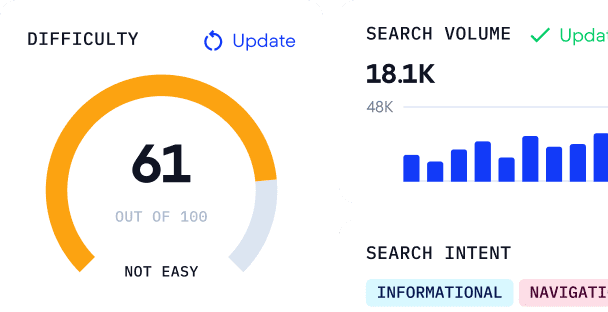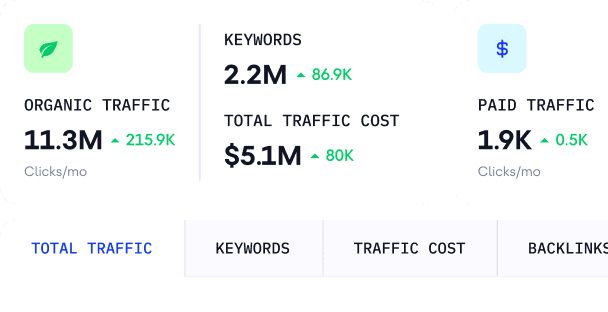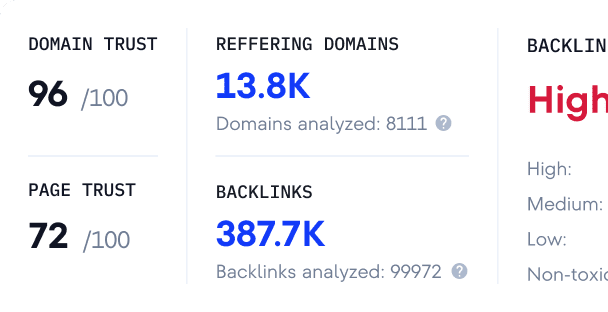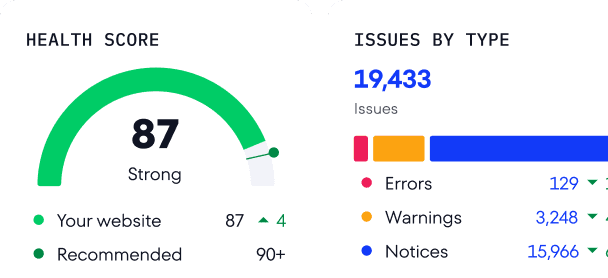Plumber SEO guide: Proven strategies for plumbing companies
It’s challenging today to find a business that can thrive without active online promotion. Since SEO helps you attract more clients and increase profits, you shouldn’t overlook it, even if you run a small or local business like a plumbing service.
In this article, we will share tips on SEO for plumbers: why it is crucial, how to effectively promote your business, key areas to focus on in optimization, and how to get a successful strategy going.
Let’s get started.
Key takeaways
- Plumber SEO improves your business’s online visibility, website traffic, and client trust. This results in an increase in both the number of clients and overall profit. So, if you want your plumbing business to grow, you need to focus on search engine optimization.
- Focus on local SEO by optimizing your Google Business Profile, adding listings, and monitoring reviews.
- Create valuable content with relevant plumbing keywords and optimize all on-page elements. Demonstrate expertise, experience, authority, and trust in your content.
- Get high-quality backlinks to your website by submitting to directories, guest blogging, creating viral content, etc.
- Work on mobile aspects of your SEO for plumbers. Focus on user experience, and track your technical health to fix issues and avoid ranking drops.
- Regularly track your SEO progress with Google Search Console, Google Analytics, and specialized SEO tools, and adjust your strategy as needed.
What is plumber SEO?
Plumber SEO is the practice of optimizing a plumbing website and improving its online presence. This can be achieved by local SEO, keyword optimization, technical adjustments, off-page and on-page SEO, and so on. This increases your business’s visibility and attracts more qualified leads, and causes your listing or website to appear higher on SERPs.
For instance, a user searches for “emergency plumber in Los Angeles” or “water heater repair near me.” By learning the process of SEO for plumbing companies and implementing it properly, you are showing search engines that your business is the perfect match for related searches. Potential clients will see you in the search results for their queries if you do everything right:
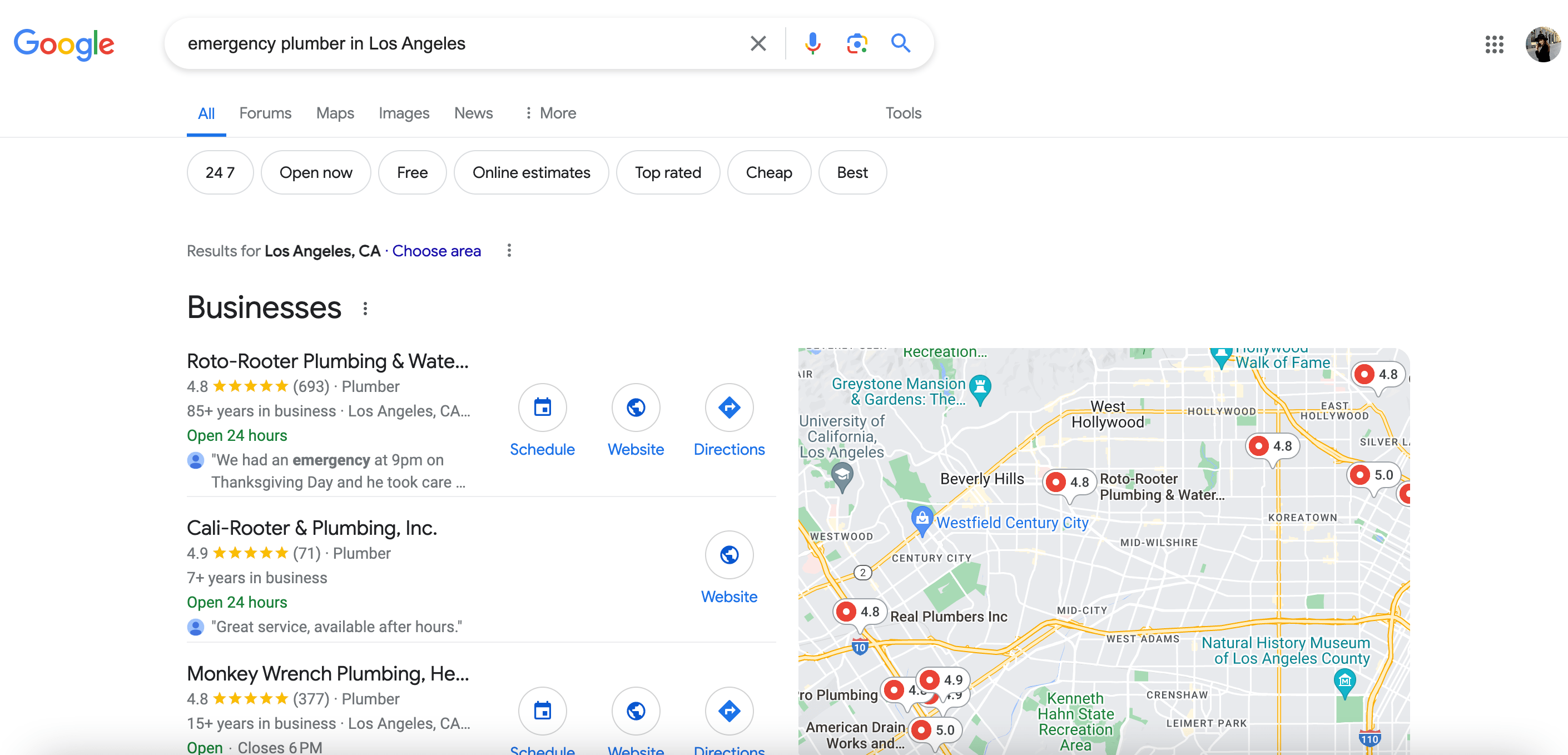
Why would a plumbing business need a website?
Not every plumbing company needs a website. Local SEO and directory listings are generally enough, but having a website can help you attract more clients and increase your earnings. Let’s quickly explore what makes a website important for a plumbing business:
- Showcasing your services and expertise
With a website, you can easily show your past projects, demonstrating your skills and the quality of your work. This helps potential customers see what you offer and the professionalism you bring. Additionally, a website allows you to educate visitors. You can provide detailed service descriptions and comprehensive blog posts or how-to guides. These position you as an expert in the field.
- Building credibility with potential customers
In plumbing, trust is key. Customers want to know they’re hiring a reliable professional. You can add licenses, certifications, and industry affiliations to your website to prove your commitment to maintaining high standards and staying current. Including testimonials from happy customers on your site also helps build trust. Positive reviews show potential customers that others have had good experiences with your services. This gives them peace of mind.
- Making contact easy
A website makes it easy for potential customers to contact you about your services. With a visible contact form or live chat, visitors can message you conveniently online, catering to those who either prefer this method or can’t call during business hours. Plus, offering round-the-clock assistance enhances customer satisfaction and increases the likelihood of turning visitors into paying customers.
Benefits of SEO for plumbers
- It is effective to perform SEO for plumbing businesses because SEO improves online visibility and local awareness.
Having a website or listing for your plumbing business helps you reach more customers. By boosting local visibility on search engines, you ensure that your company appears at the top of SERPs, attracting more clients searching for plumbing services in your area. A significant proof of this is the number of queries per month. For example, according to SE Ranking’s Keyword Research tool, there are 823,000 monthly searches for “plumbers near me” in the USA alone:
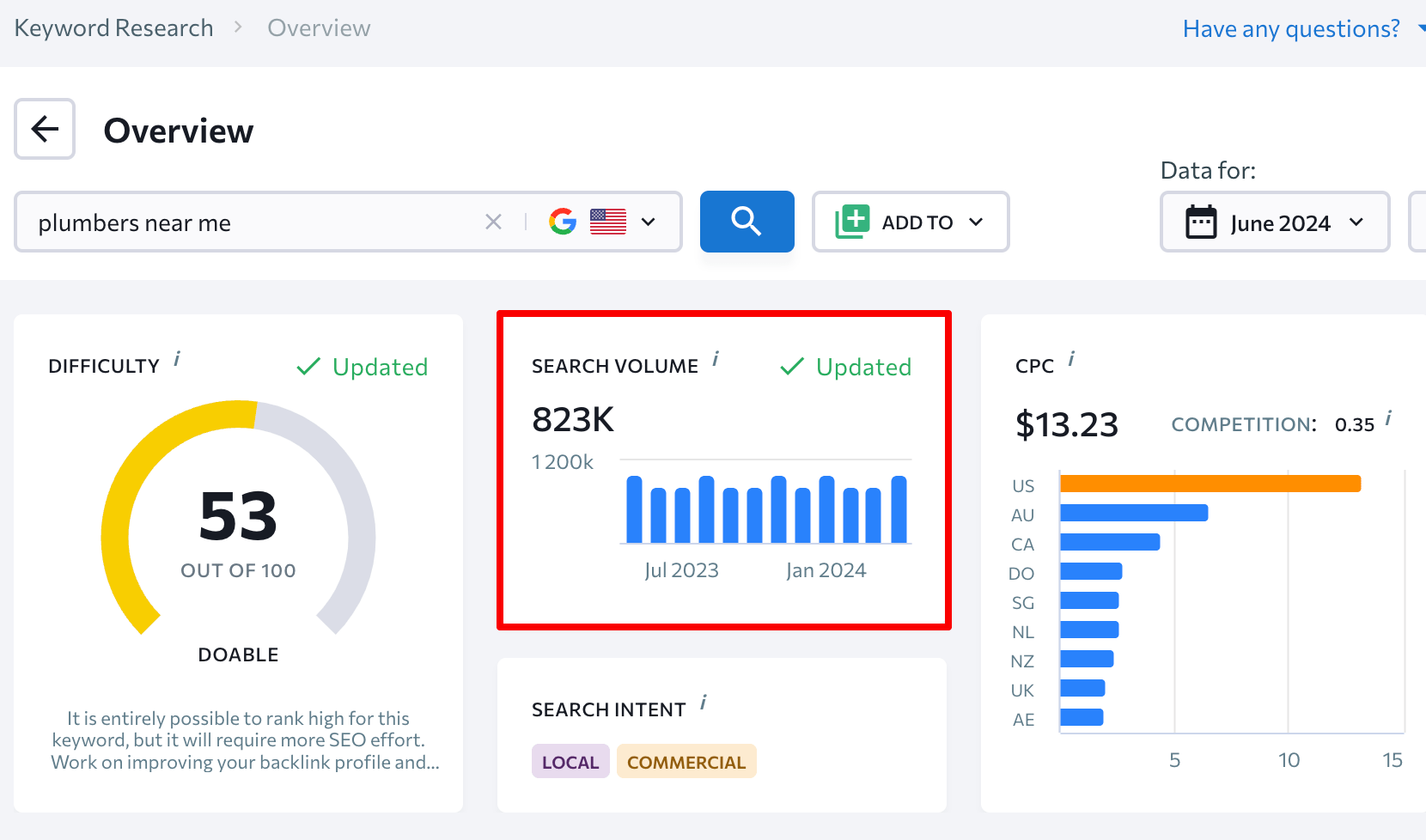
Imagine your company getting seen by 800,000 people! These numbers are unlikely to be achieved through other channels (like traditional advertising). When considering that people turn to search engines directly when looking for services, the benefits of SEO for your plumbing company are many.
- SEO increases your website traffic.
If your website appears at the top of search results, it will significantly increase the amount of traffic to your site. People will be able to discover your website organically. Here’s an approximation of the traffic that pages at the top of the search results for the query “plumbers near me” can receive per month:
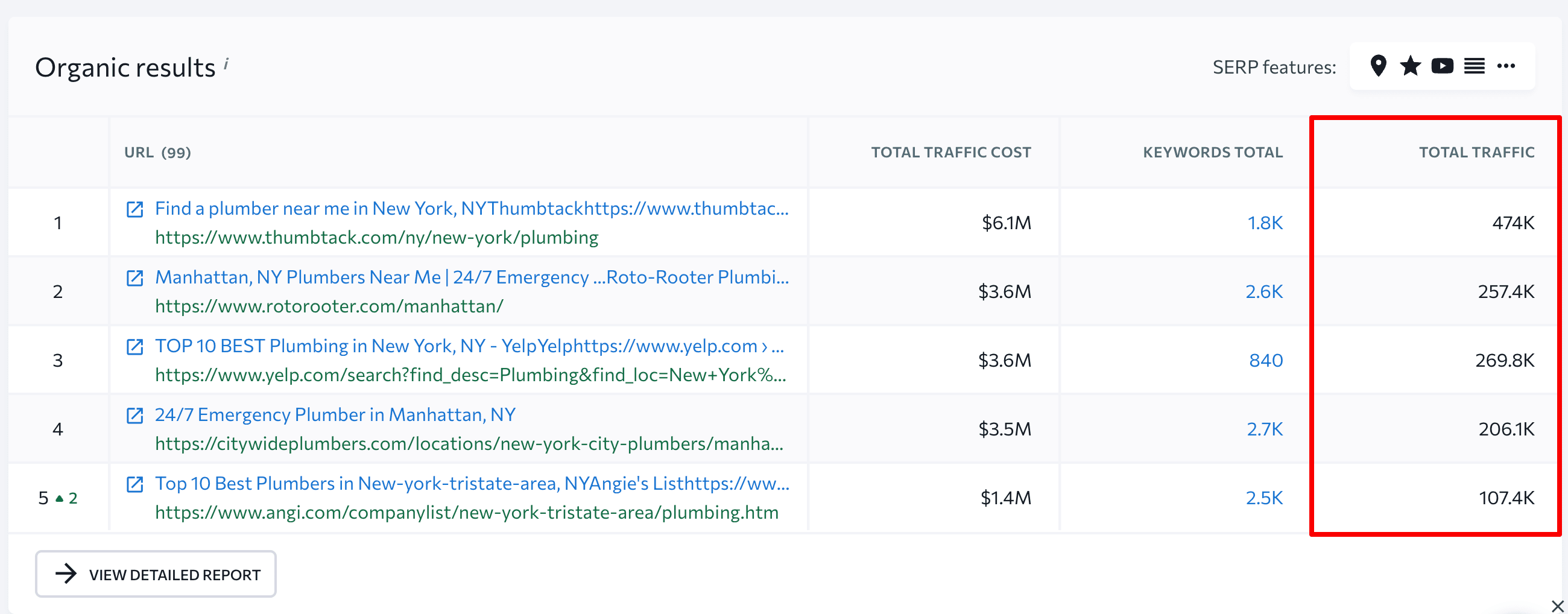
These numbers are impressive, aren’t they? Each number indicates an interested person, and a potential client.
- Performing SEO for plumbing helps you grow your client base.
From the previous point, it follows that if people visit your website and learn about you, a certain percentage of them will definitely reach out to you. By working on optimizing your website, you increase your customer base.
Let’s take the average landing page conversion rate (the percentage of visitors to a website who take a desired action), which is usually 2.35%. If your website attracts 10,000 visitors per month, you could get 235 clients (10,000 * 2.35%). Imagine if you attracted even more traffic to your website! The expansion of your customer base is limitless with SEO.
- Doing SEO for plumbers correctly builds trust and credibility with customers.
A strong SEO strategy will help you establish your plumbing business as a top choice in your area. For example, let’s imagine you optimize your landing page or listing for the keyword “emergency plumber near me.” When searching for this query, users will find that your website or listing has positive reviews and a high rating, making it clear that you are trustworthy and worth their attention.
Of course, you can use an alternative channel to attract potential customers: PPC marketing. This online advertising model requires you to pay a fee each time someone clicks on your ad. It’s a way to buy visits to your site, rather than earning them organically. If you have been on Google, you have seen PPC ads.
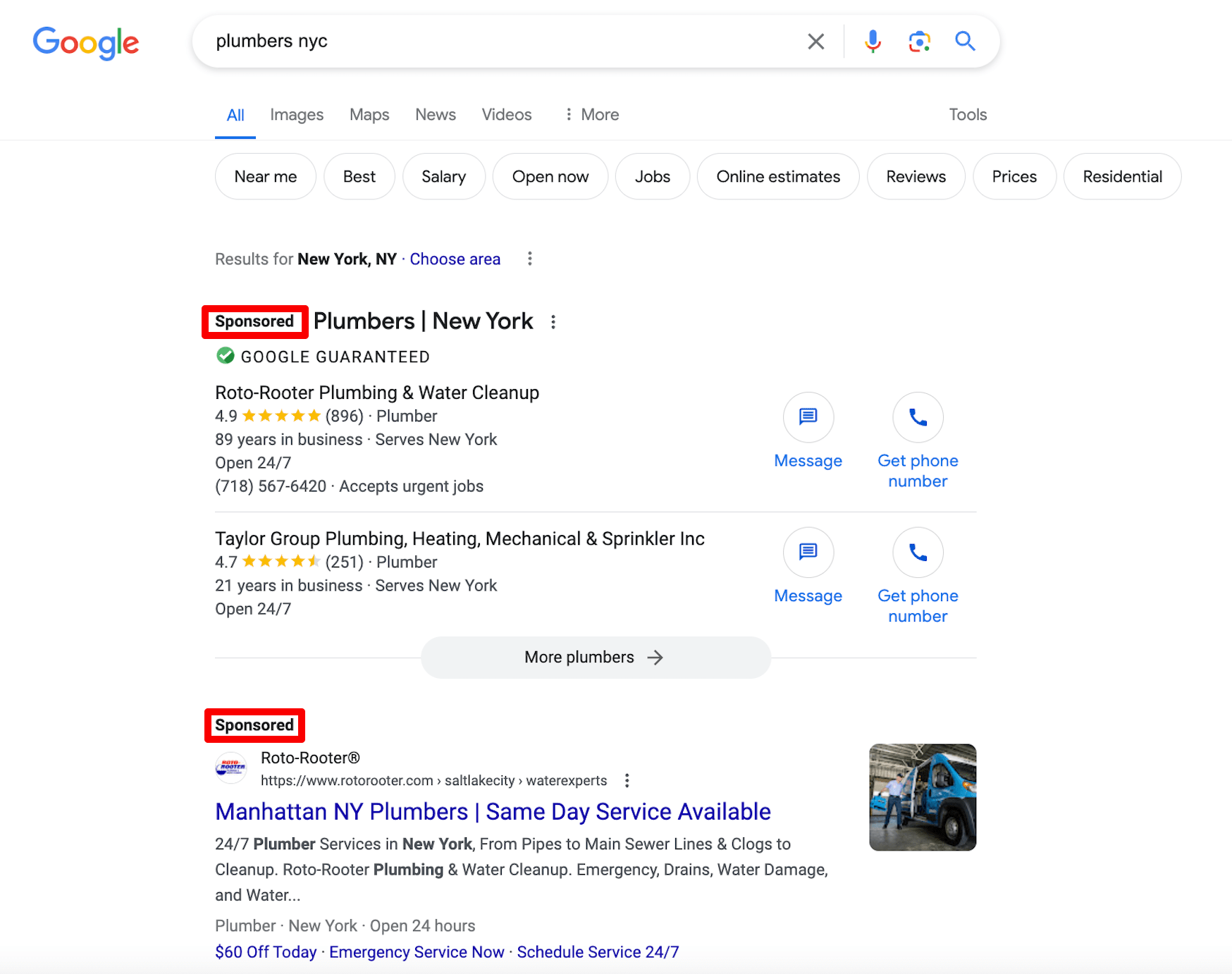
In fact, it is a much faster way to get clients. However, SEO is a cheaper channel that will bring you more stable and loyal traffic. We will explore how to work with this organic channel below.
How to do SEO for plumbing companies
We’ve reached the main part of this complete guide. To do SEO for plumbers properly, you will have to follow the same basic steps as regular SEO, but with a key difference: there is a strong emphasis on local SEO. Let’s dive into the aspects you need to consider to achieve top rankings in SERPs.
Local SEO
The plumbing niche focuses on providing services within a specific area, such as a city or a district. This makes local SEO a crucial aspect of optimization, meaning plumbing contractors should focus on it. This is the most efficient way to attract the attention of your target audience within your service area.
Create and optimize your Google Business Profile
As you may have noticed in the screenshots above, SERPs for plumbing services often show the Local Pack—a map containing a list of relevant companies. To appear in this list, you need to create and optimize a Google Business Profile (GBP).
For a plumbing business, the information typically displayed in the Local Pack includes:
- Company name
- Rating and number of reviews
- Service area and address
- Phone number
- Working hours
- Website link
- Additional details such as business description, years in business and booking options, etc.
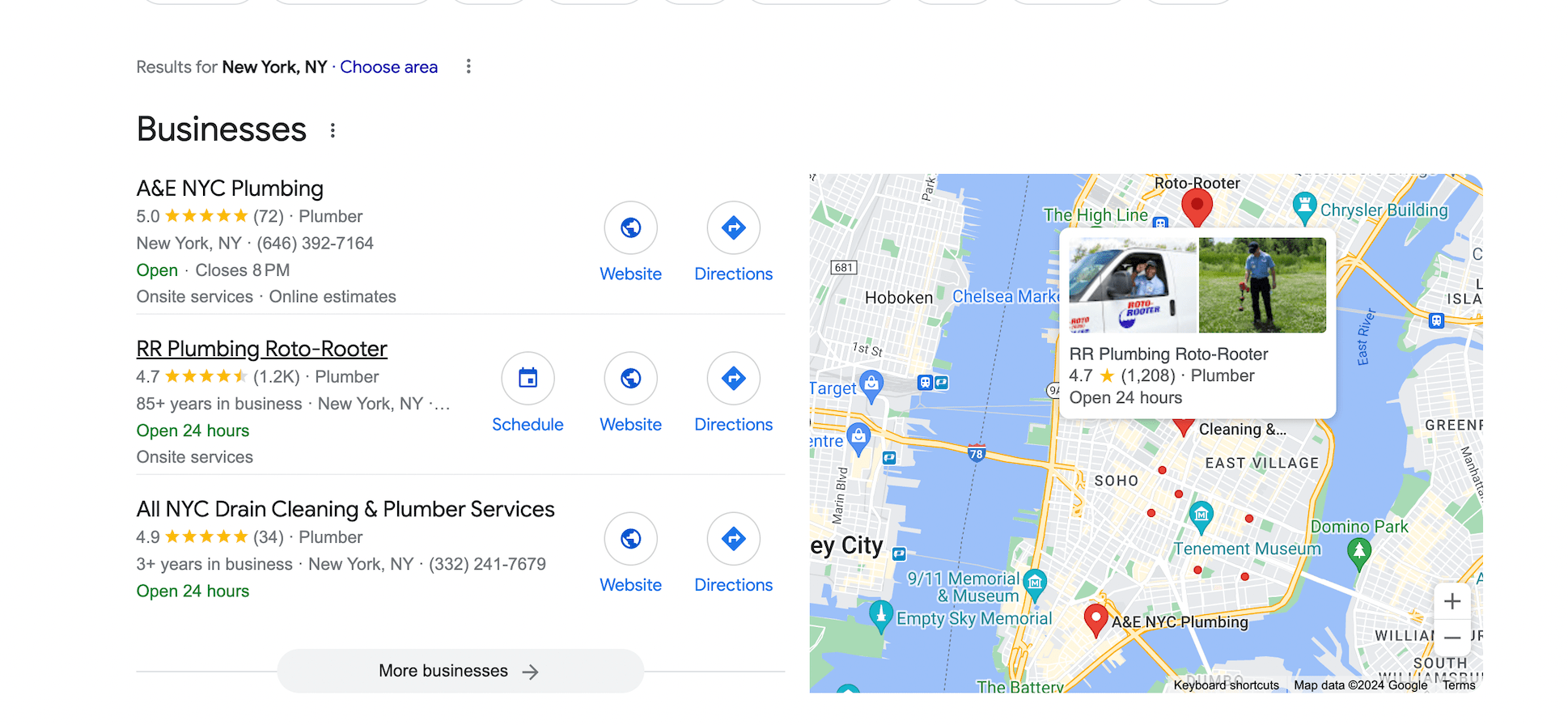
Ensure you fill out all of this information thoroughly in your Google Business Profile. If you haven’t registered yet, do so now to avoid missing out on hundreds, if not thousands, of potential customers. If you have any issues with GBP verification, refer to our guide.
Add your business to trustworthy directories
Local directories list businesses within specific geographical areas to make it easier for customers to find your services. These listings typically appear at the top of search results, significantly boosting your chances of being noticed by potential clients. Local directories are considered authoritative resources, meaning that being featured in them builds user trust and loyalty in your company.
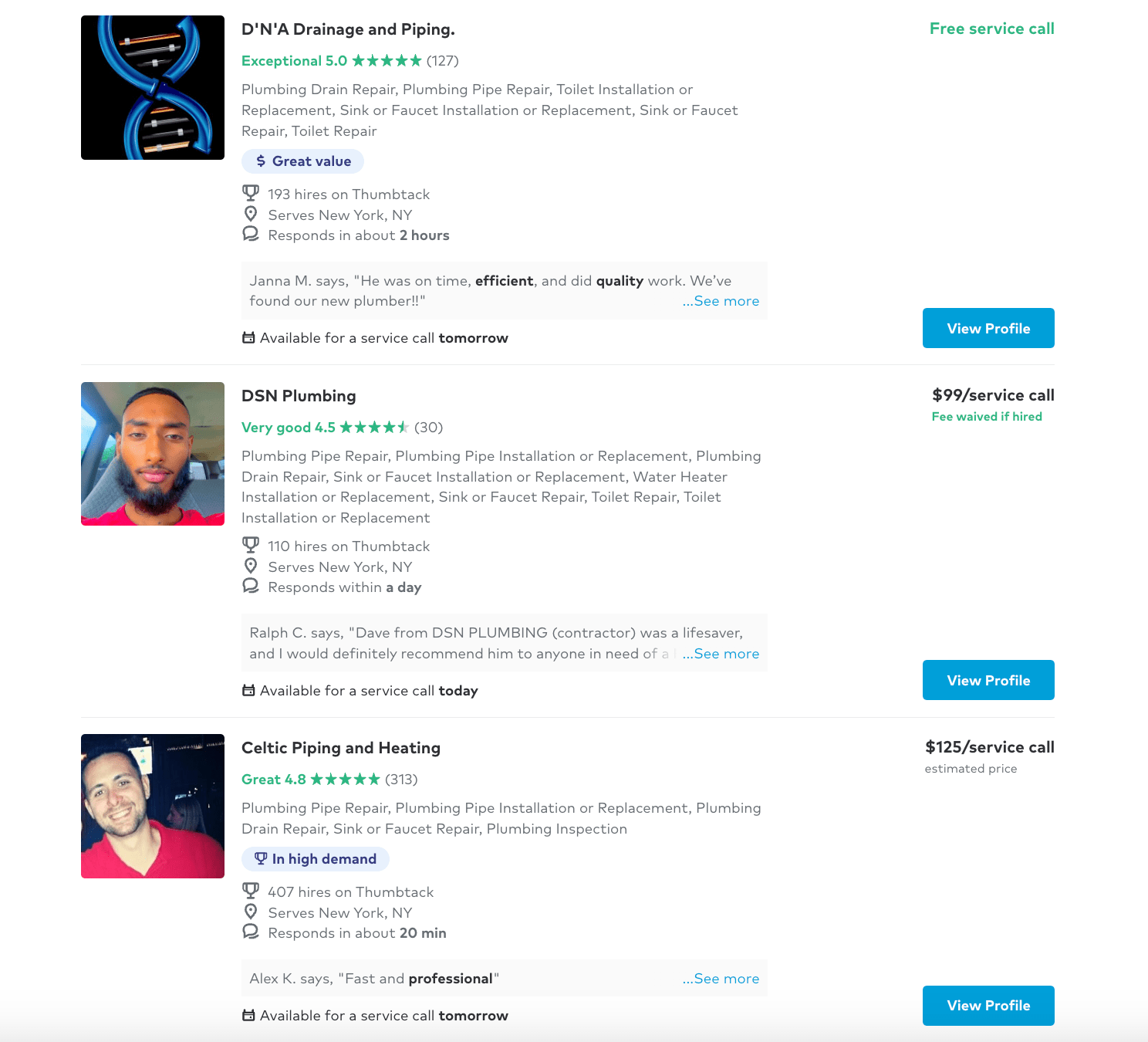
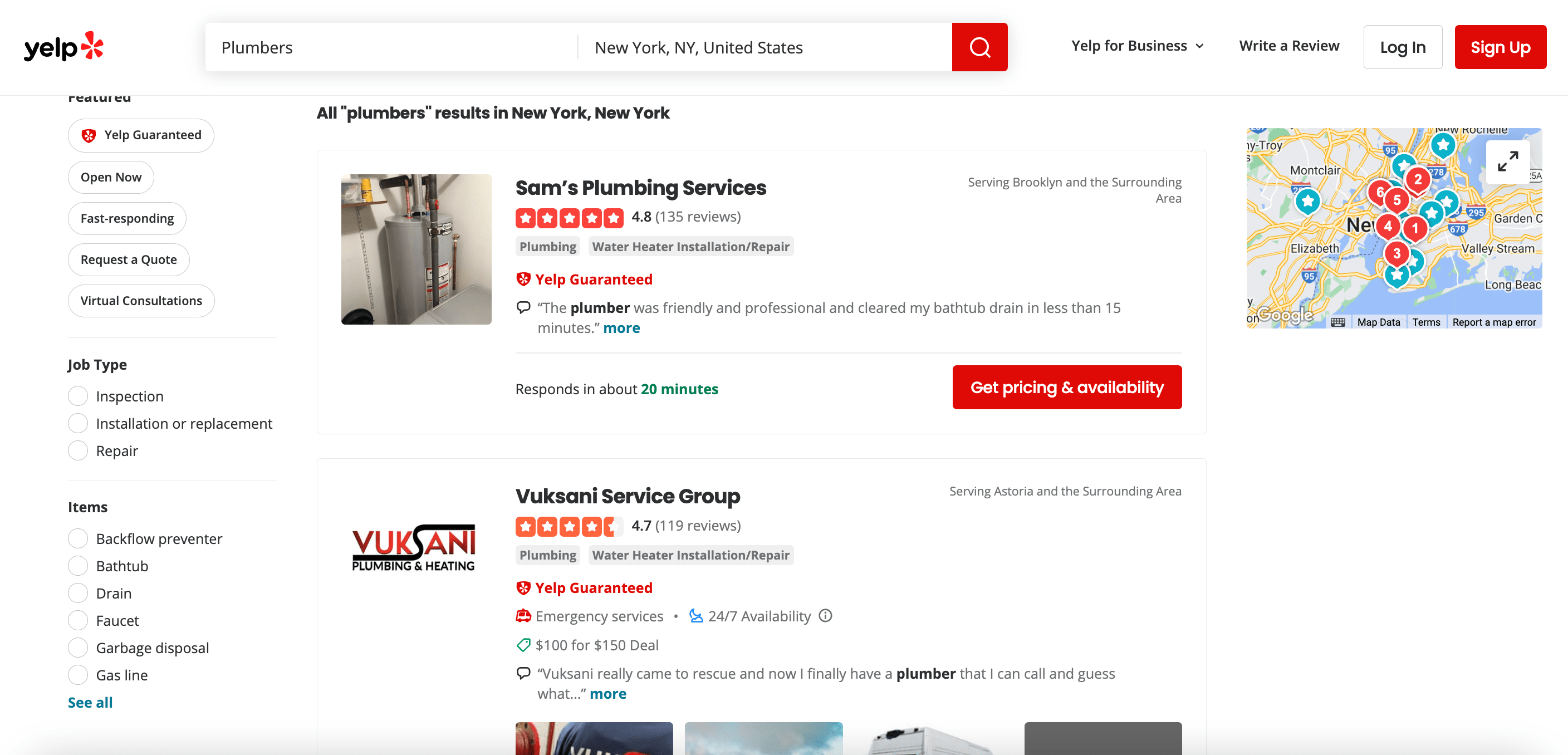
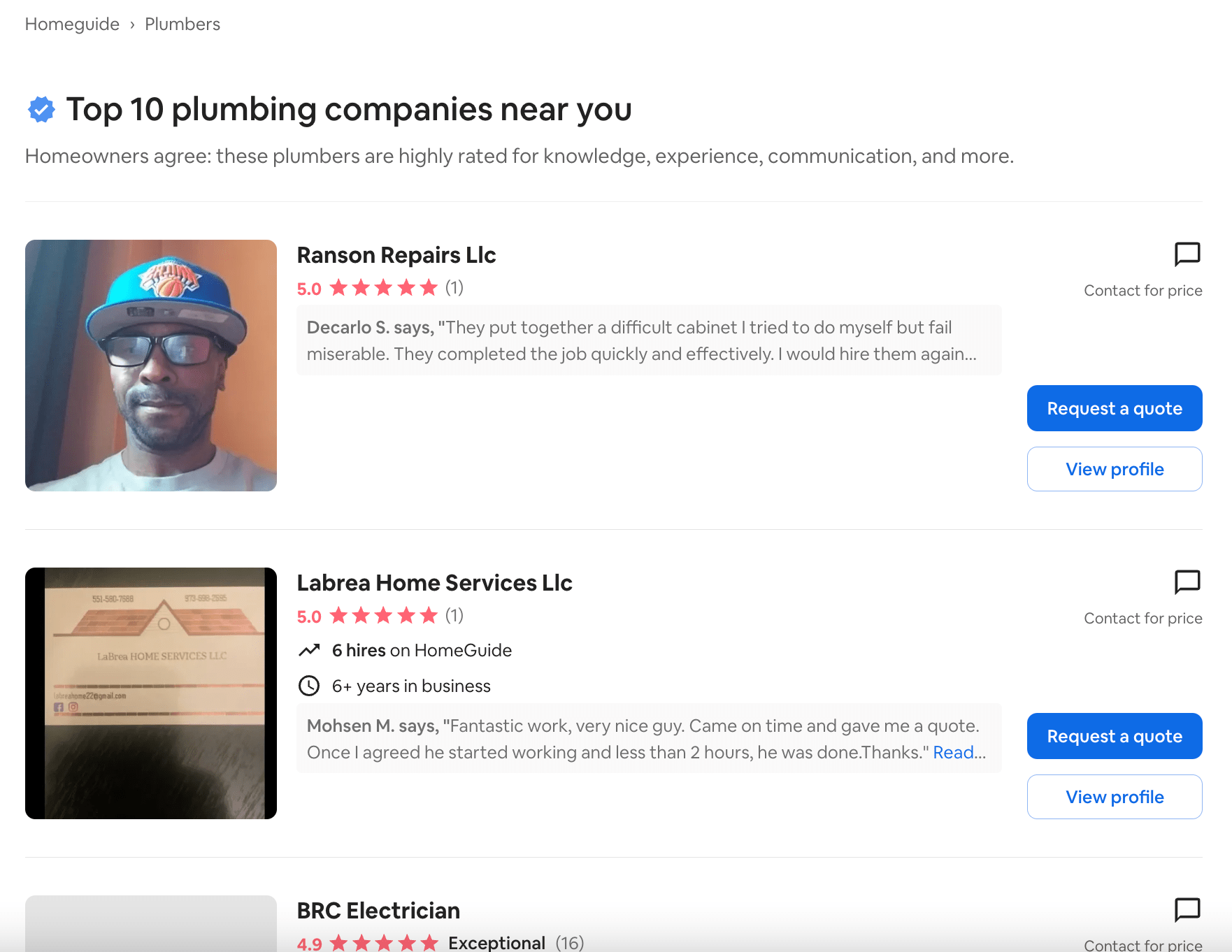
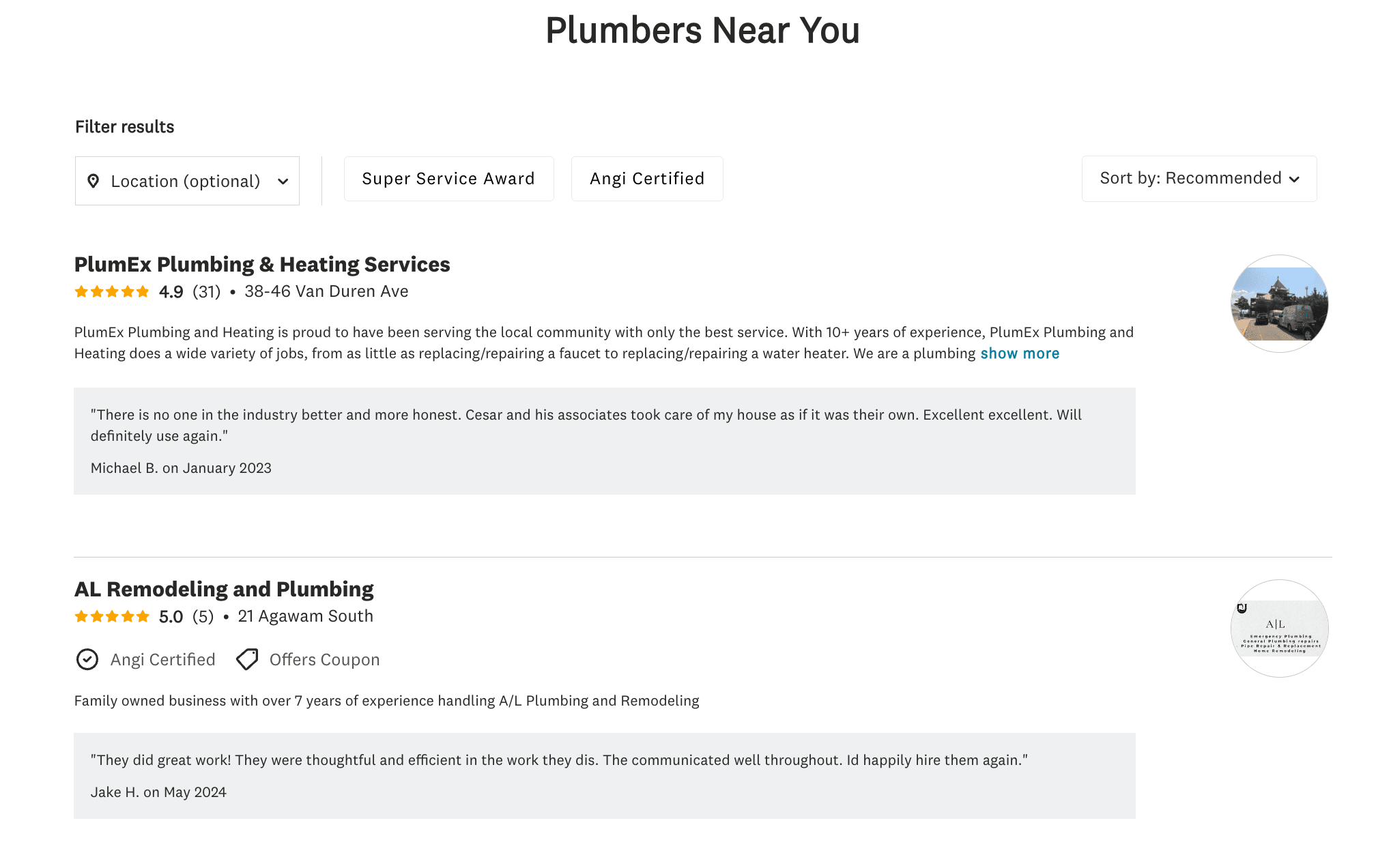
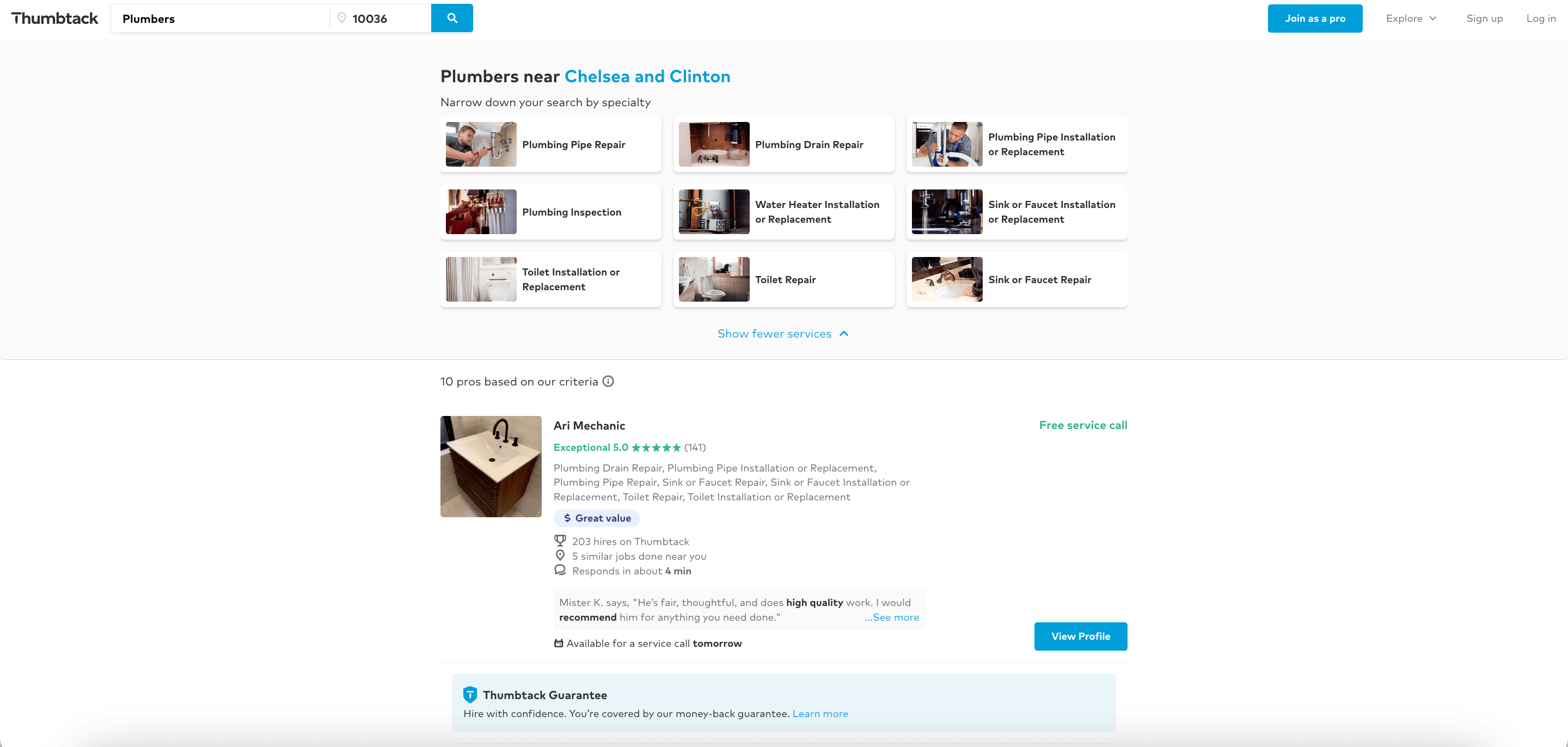
You should list your company on all trustworthy directories, including common ones like Yelp, and niche listings within the plumbing services or home repairs niches.
To determine the most effective directories for your business, conducting some research is necessary. Try searching on Google using various queries such as “plumbers near me,” “emergency plumber near me,” “plumber NYC,” or “plumbing company.” You’ll see directories on the first pages of search results.
For plumbing companies in the USA, we’ve simplified this task by creating a list of popular directories. Feel free to use it:
- Yelp
- Angi
- Home Advisor
- BestPlumbers
- Thumbtack
- Contractors
- Grow Plumbing
- HVAC Yellow Pages
- My Zip Plumbers
Make sure your company data is consistent across all listings
Your business information, including NAP (name, address, and phone number), working hours, etc., must remain the same across all listings. There are two main reasons for this. Google views listing consistency as a sign of trustworthiness, which can impact your rankings. Second, this prevents you from confusing potential clients.
To keep track of NAP info, you can use SE Ranking’s Local Marketing tool. This tool provides information on any NAP inconsistencies in each listing.
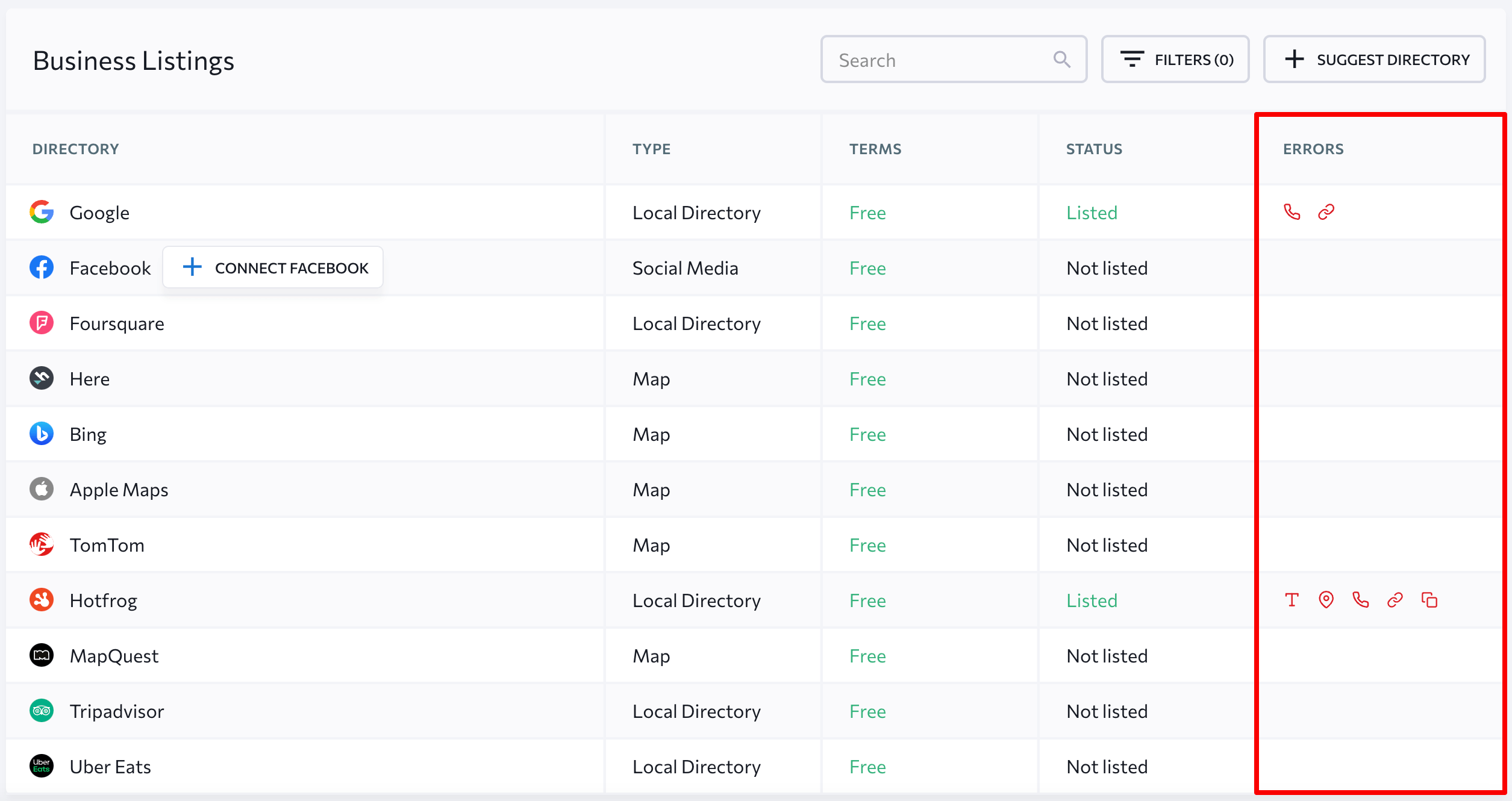
Encourage customers to leave positive reviews
It’s crucial to listen and respond to what customers are saying about your business. Contact happy clients and ask them to share their experience on Google or through different listings. Make the process easy for them by providing direct links to your review profiles. You can do this through email or SMS campaigns.
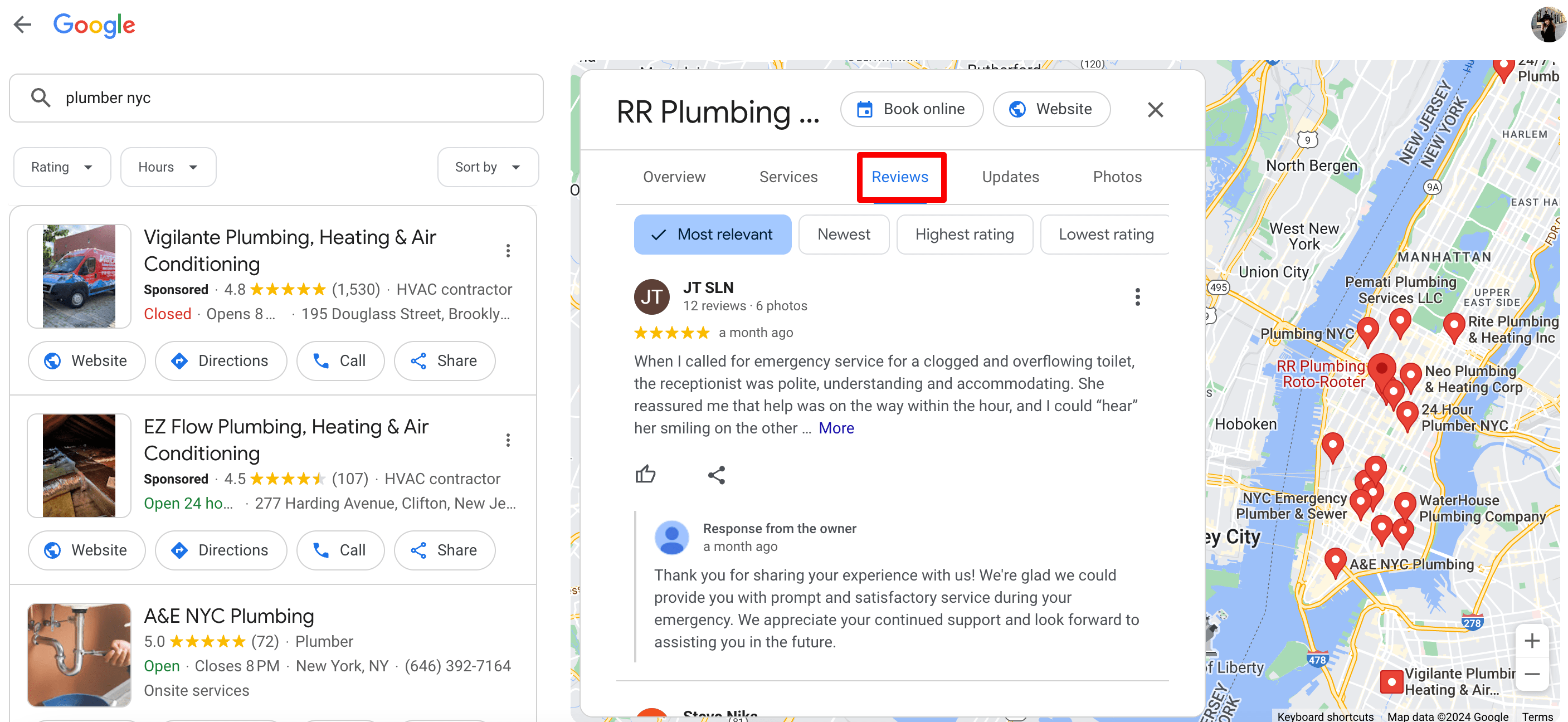
Having a high rating and positive reviews will definitely benefit you. Many people value social proof when deciding which company to use for services.
Competitor and keyword research
Potential clients can only see your site for specific queries if you have the appropriate plumbing keywords in your content. So, to attract the right audience to your website, identify and target the most relevant keywords. Here is how:
1️⃣ Brainstorm terms related to the plumbing business. For instance:
- plumbers + [your city]
- plumbing company + [your city]
- emergency plumbers
- garbage disposal repair
- sump pump installer
- shower repair
- sink disposal replacement
This will be your list of seed keywords (broad terms related to your business’s niche).
2️⃣ Next, get different keyword suggestions. SE Ranking’s Keyword Research tool can help you with this task. Simply paste a seed keyword into the search box, and the tool will provide you with similar and related terms.
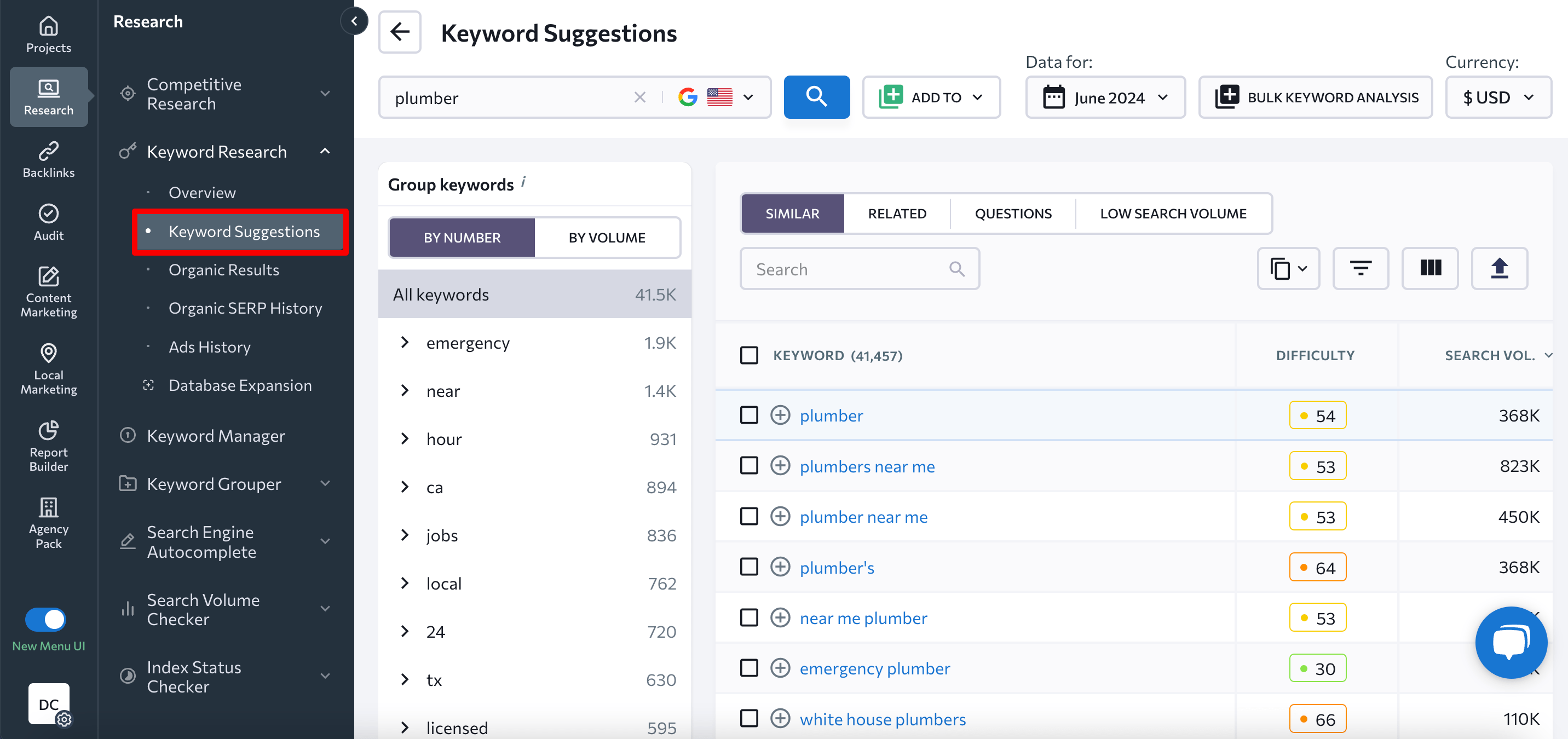
3️⃣ While choosing the right keywords, pay special attention to metrics like search volume (how popular the keyword is among users), search intent (the reason why a user types a particular query into a search engine), and difficulty (how hard it is to rank for that keyword). Not all keywords are equally valuable. You need to choose those that have potential to substantiate your plumber SEO initiatives. For instance, it’s better to avoid keywords with high difficulty or low search volume.
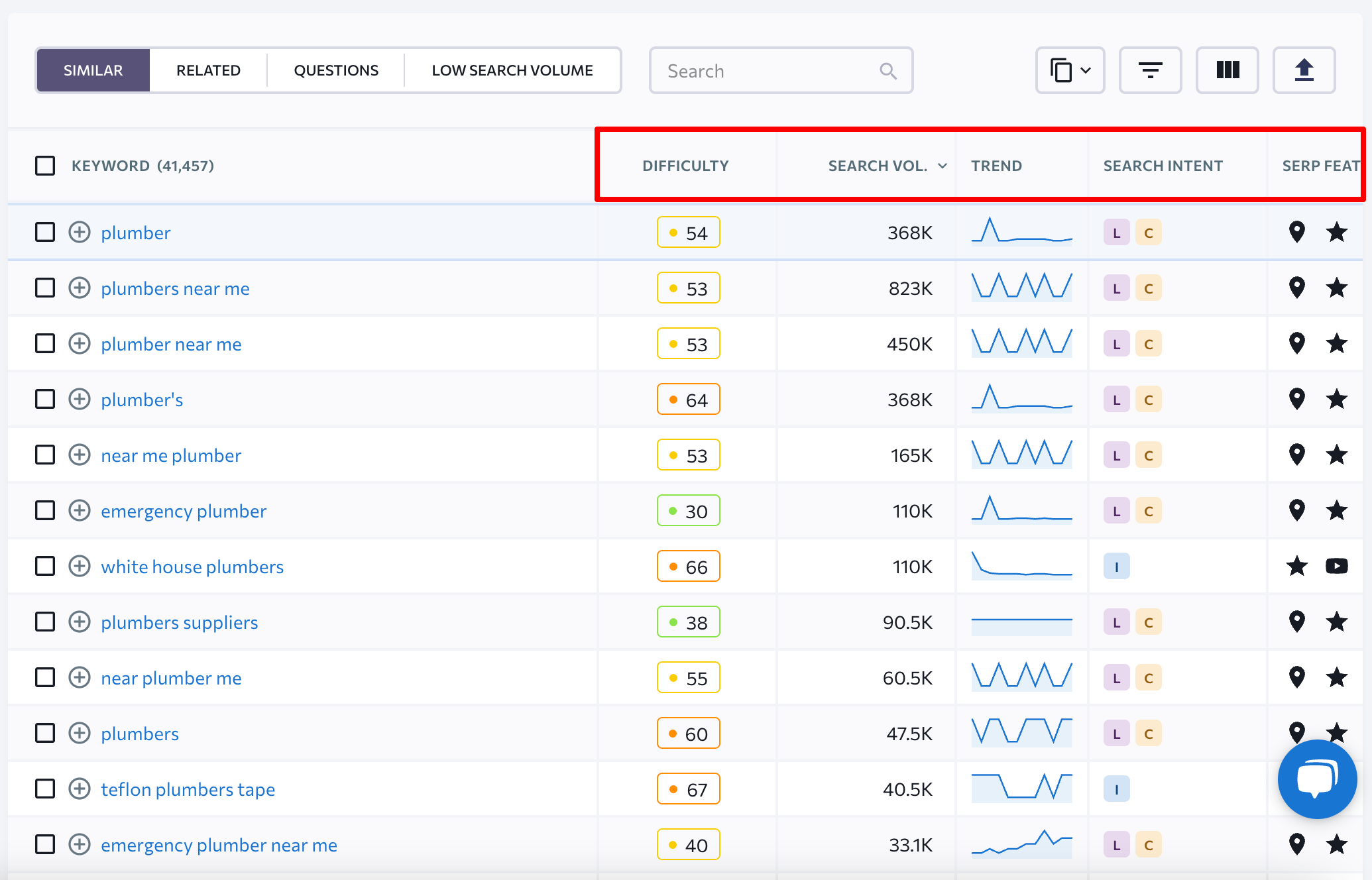
Another way to collect relevant terms that already work well in your niche is to observe competitors’ keywords.
To identify your direct and indirect competitors, you can enter your seed keywords into Google and observe the websites in the top 10 results. If they rank highly, their SEO strategy is likely effective. After consolidating all competitors into one list, you can start finding new keyword opportunities.
You can easily find valuable keywords used by your competition (but not by you) with SE Ranking’s Competitor Research tool. Analyze your website and go to the Competitor Comparison tab. This is where you can put your domain up against two competitors. Pay special attention to the keywords in the Missing group to figure out which of them to target.
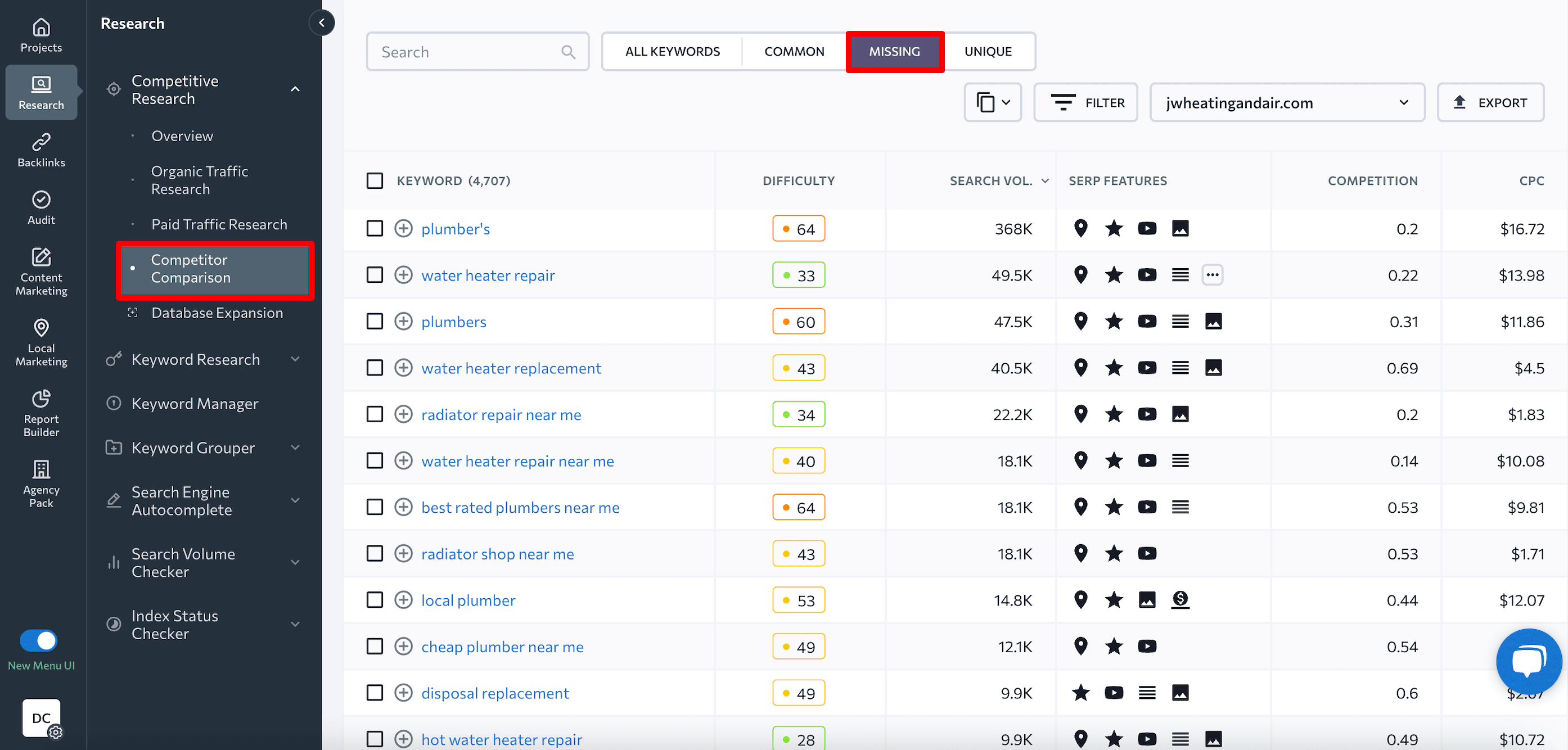
If you are about to launch a website, enter your competitor’s domain and use the Organic Traffic Research section to discover their most valuable keywords.
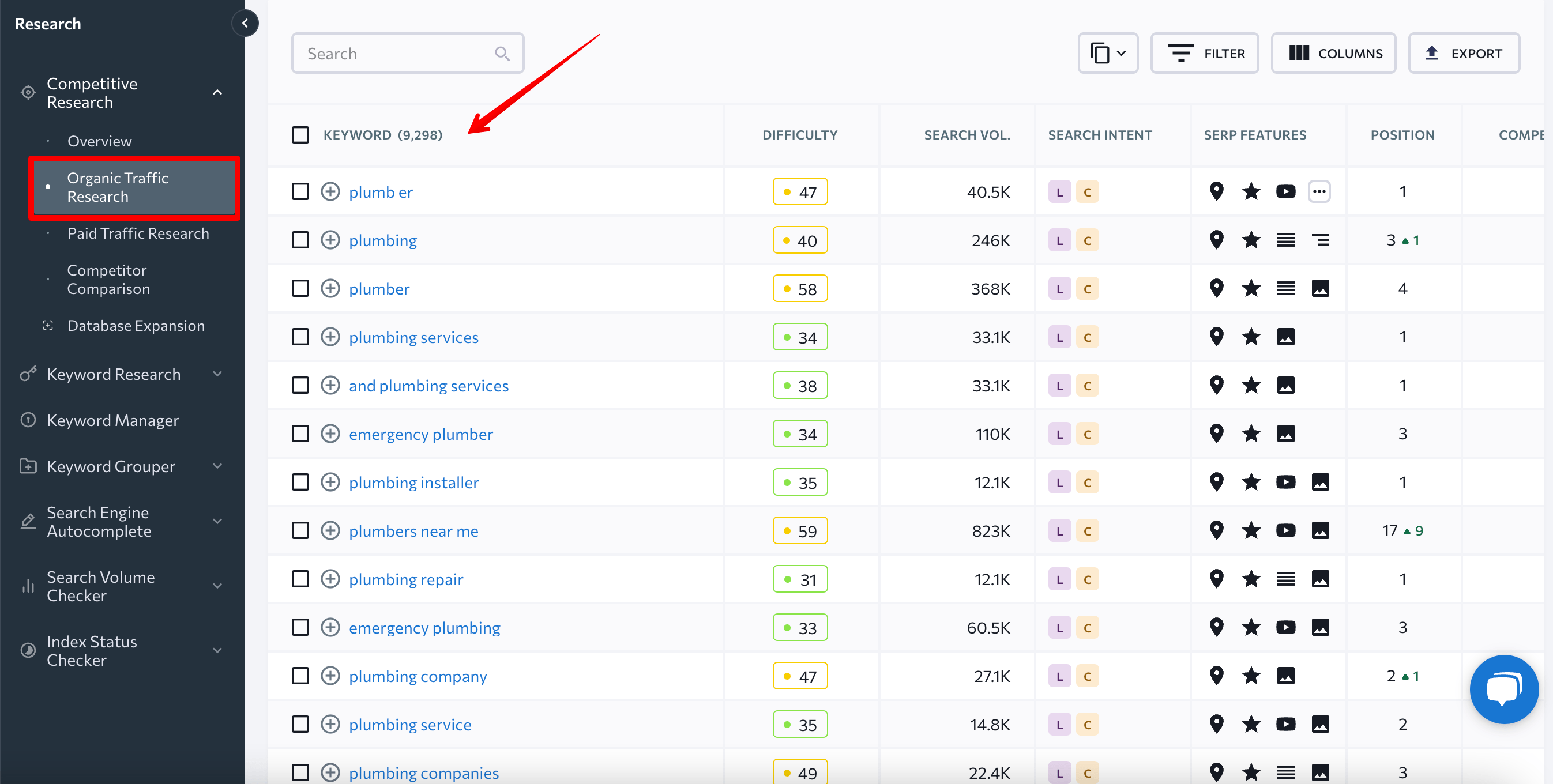
Furthermore, you can draw inspiration from your competitors’ content marketing strategy and adopt successful content and topic ideas for your own pages. Analyze the search results for your target keywords to identify the types of content that rank well. This can provide insights into the content that best resonates with your audience.
For example, when you search for “kitchen sink plumbing,” the results often include videos and detailed how-to guides on sink installation. So, if you want to rank at the top for this query, create a comprehensive informational article on the topic.
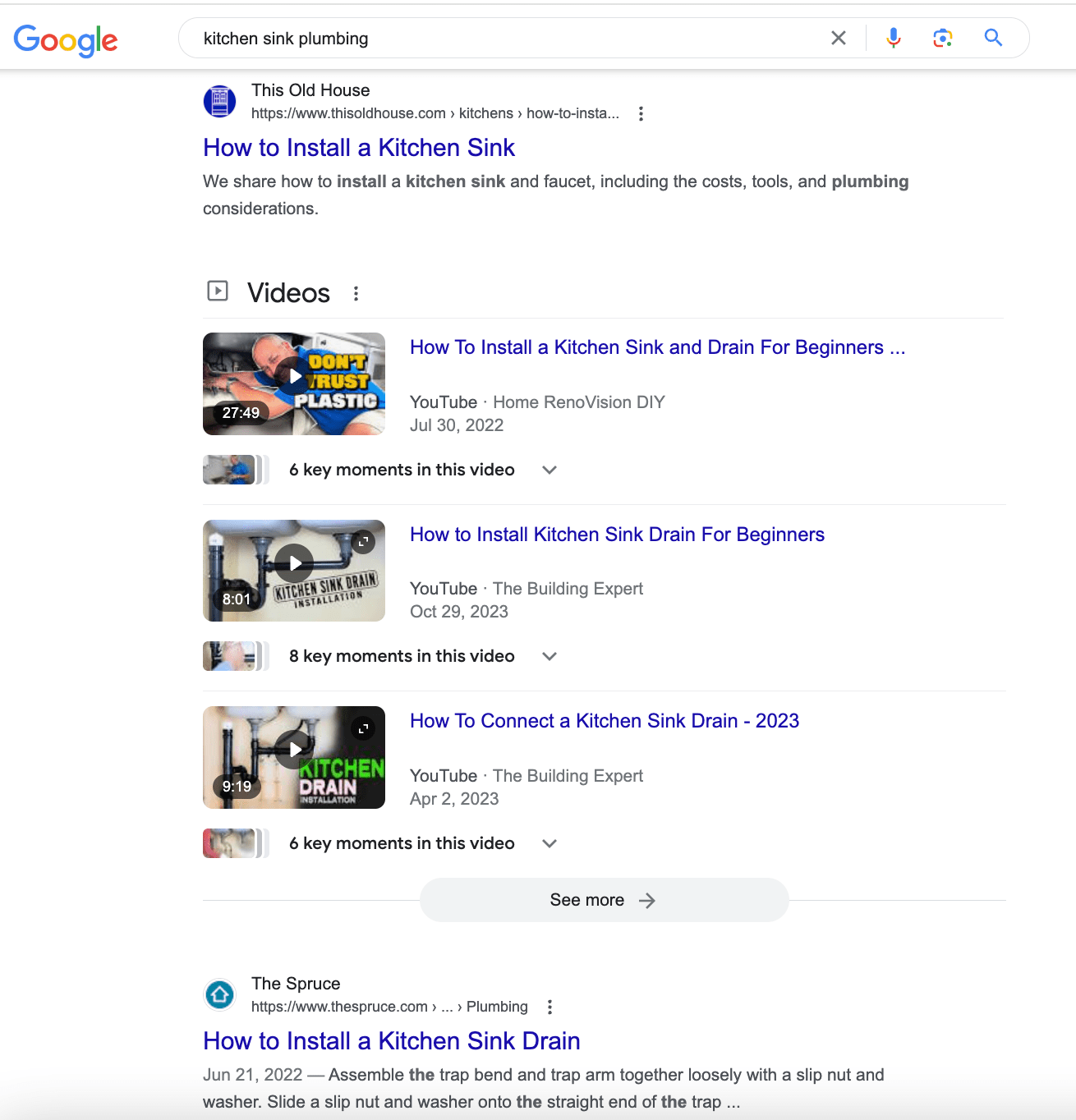
You can also use the Pages option in SE Ranking’s Competitor Research feature to accomplish this. Research the top-performing pages of your competitors to identify types of content to focus on during optimization. For instance, mrrooter.com receives the most traffic from blog articles that provide solutions to various plumbing problems.
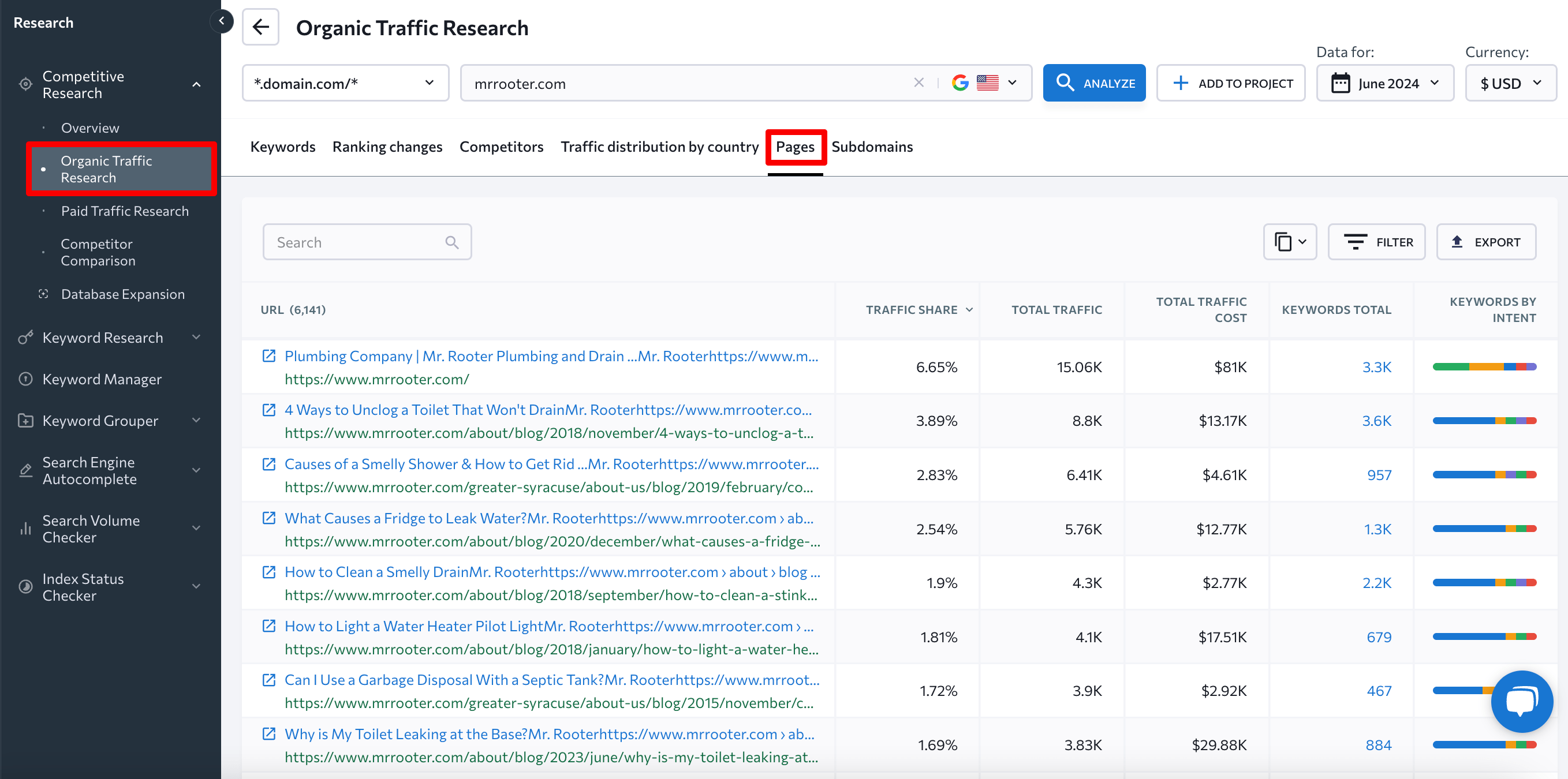
Content and on-page SEO
Now that you’ve collected the keywords and analyzed your competitors, it’s time to focus on your content (pages your potential clients will see on your website). The quality and relevance of this content will determine whether a user chooses your services or leaves the site in search of better options.
Each of the aspects described in the sections below are critical. Let’s break them down step by step.
Naturally integrate relevant keywords throughout your website
Once you’ve gathered your keywords, it’s time to incorporate them into your content. To ensure they work effectively and yield results, it’s crucial to cluster (group) them appropriately. This helps prevent issues like keyword cannibalization, where multiple pages on your site compete for the same keyword.
During the clustering process, the keywords should be split into groups based on their semantic similarity and their appearance in search results. Manually clustering is quite time-consuming and complex, so it’s better to use specialized tools instead. To streamline the clustering process, you can use our Keyword Grouper tool.
Clustering isn’t always straightforward, so we suggest checking out our guide to understand it better.
Using your selected group of related keywords, you can create content that gives detailed information, answers user questions thoroughly, and meets search intent. This leads to increased user engagement and satisfaction.
Each cluster of keywords should correspond to a distinct page on your website. Integrate these terms naturally into your content without overusing them. Your primary objective should be to deliver value to visitors and capture their interest in your services.
Create landing pages for the plumbing services you provide
Landing pages are crucial for attracting clients. They are designed to showcase your services and motivate potential customers to reach out. Since landing pages are the foundation of your website, it is impossible to successfully promote your plumbing website without them.
Create a separate page for each service, providing a detailed description of what you offer and highlighting the advantages of the specific service you offer. For example, you might have separate pages for drain cleaning, leak detection and repair, toilet repair & replacement.
Let’s look at a few examples of how this can be done.
On the United Plumbing website (unitedplumbingco.com), you can easily find all services under the Plumbing category. Clicking on one of the services takes you to a dedicated landing page.
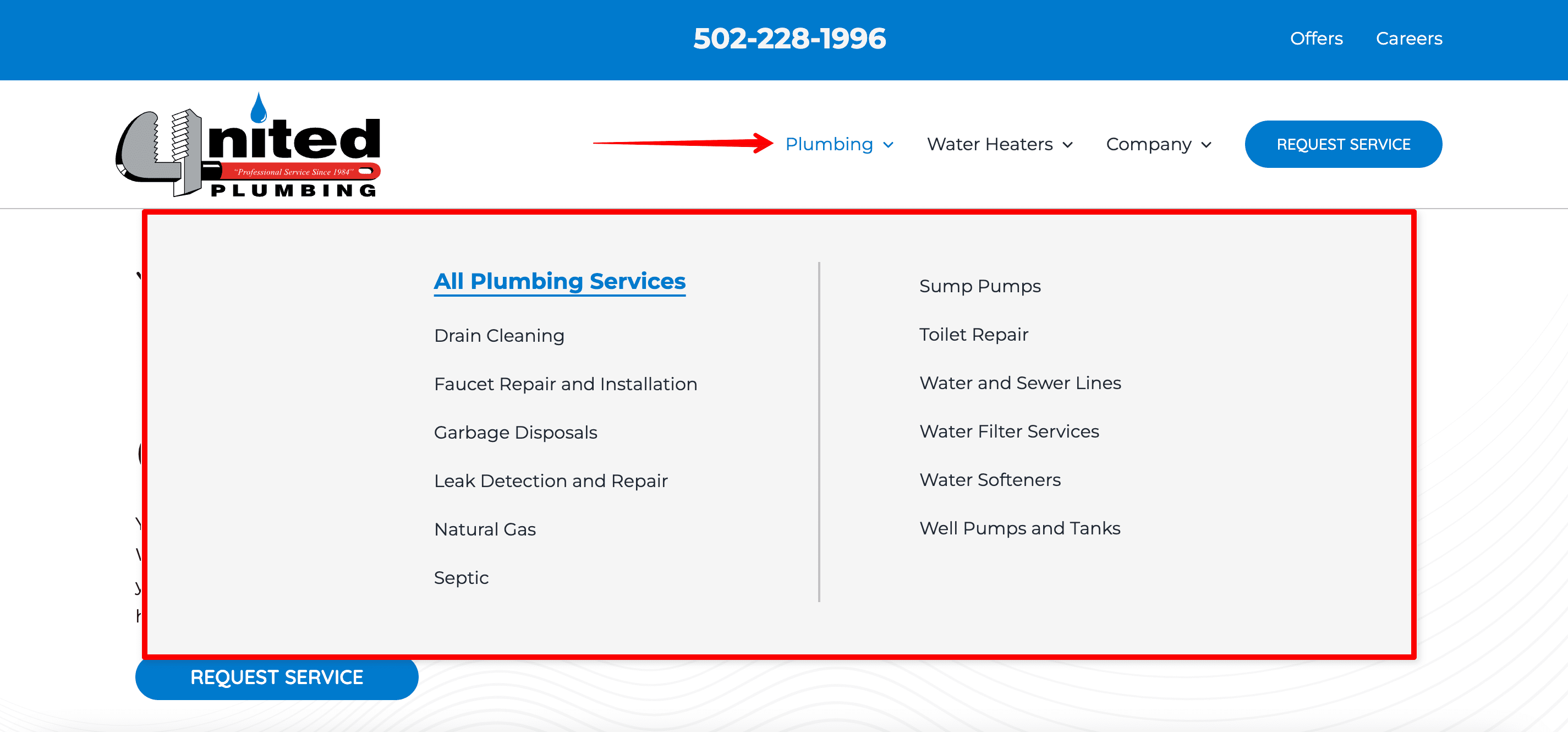
On the Rite Plumbing website (riteplumbingnyc.com), this is implemented similarly.
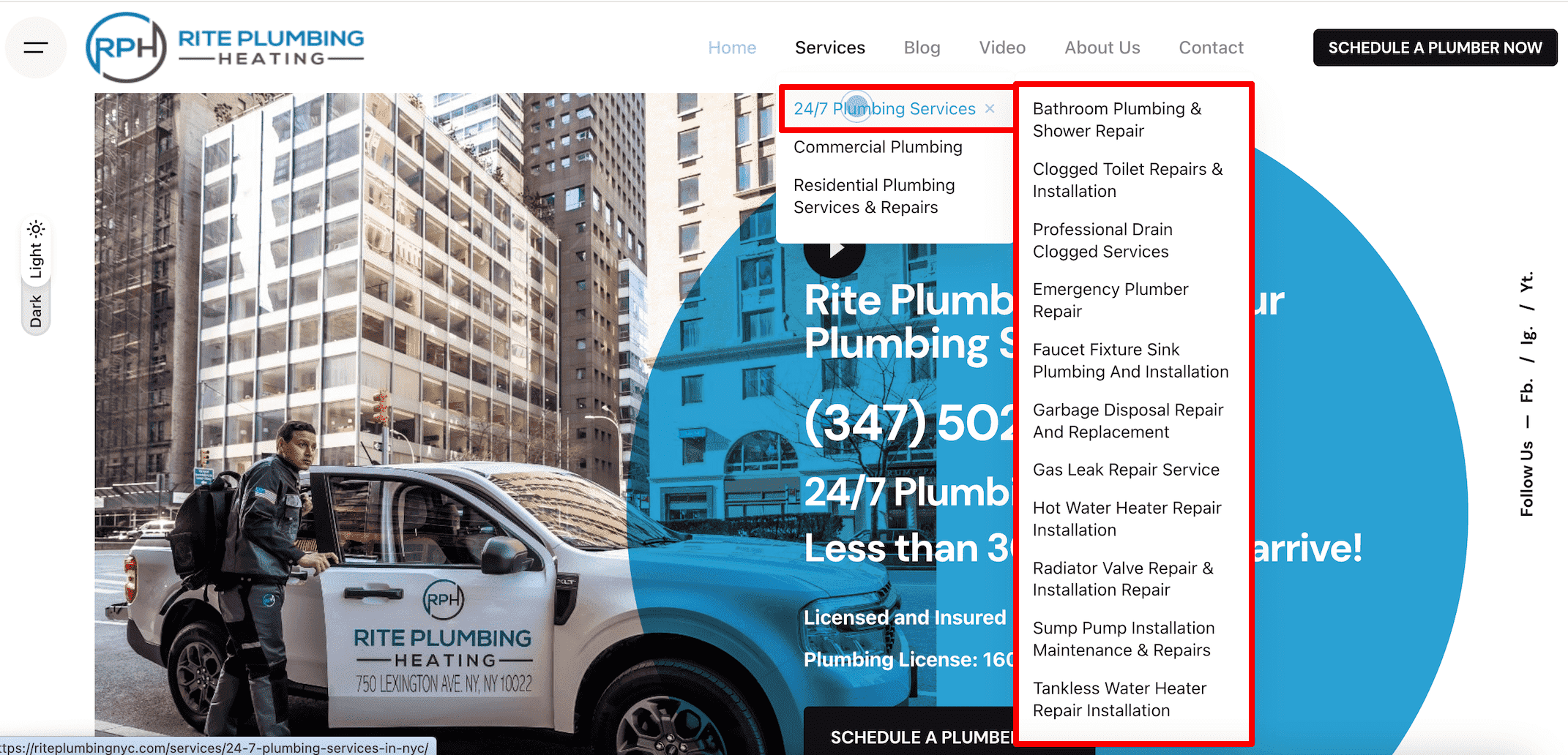
Let’s examine a specific landing page in detail. On the first screen, there’s a description of the problem and reasons why contacting professionals is the best solution.
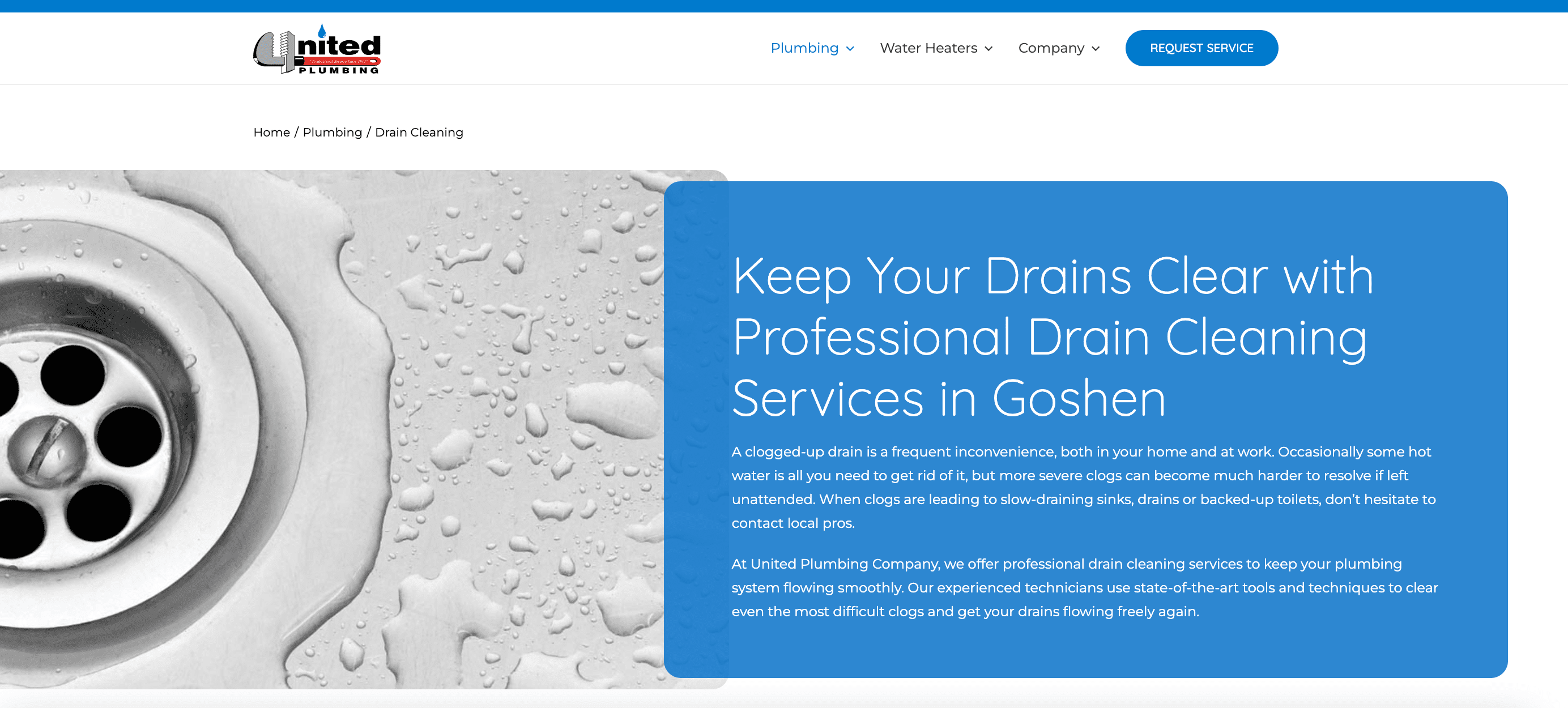
The next screen displays how to prevent this issue:
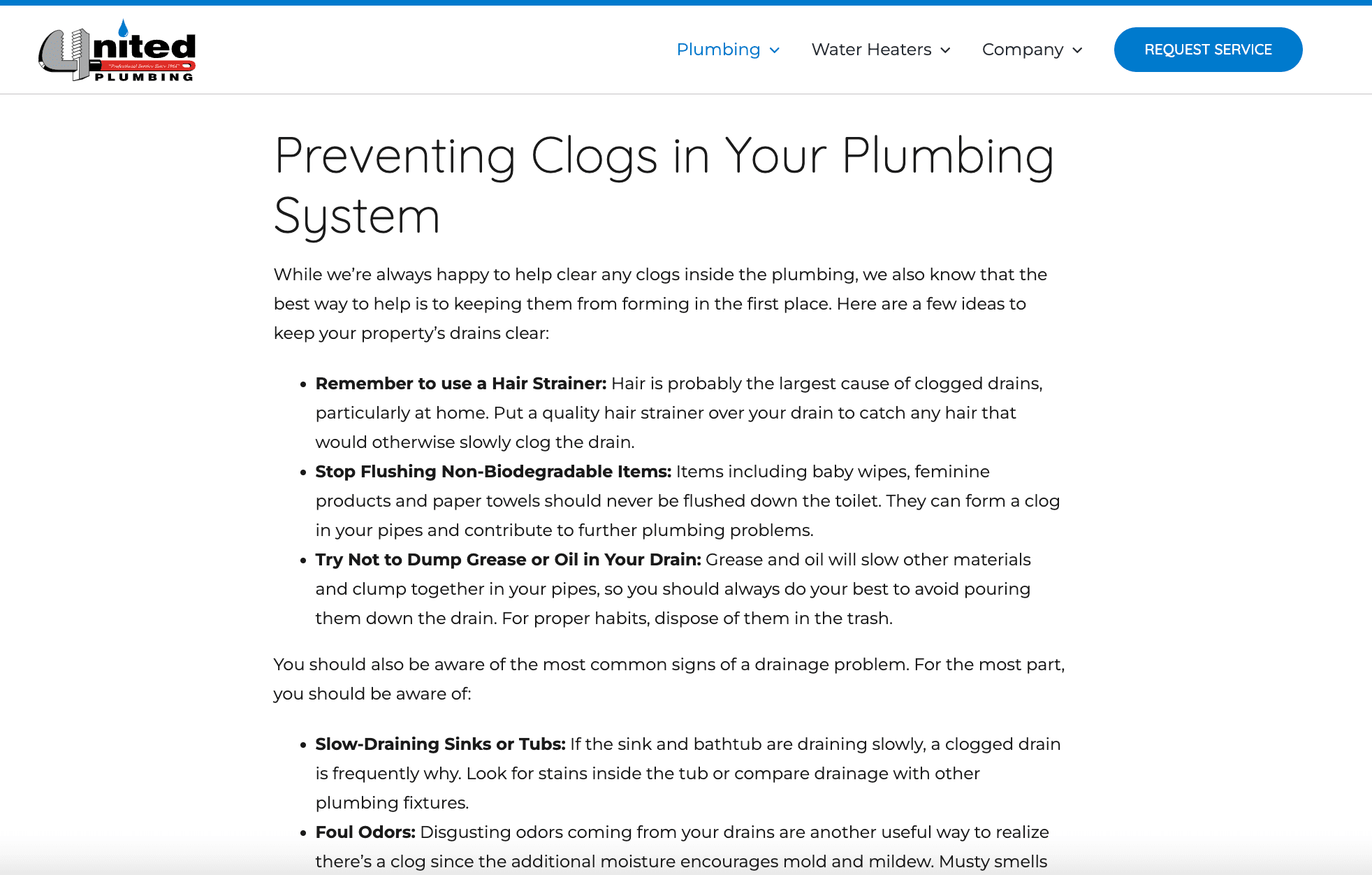
Next, United Plumbing features a contact form where visitors can easily enter their personal information and wait to be contacted. This section is essential for collecting a database of potential clients.
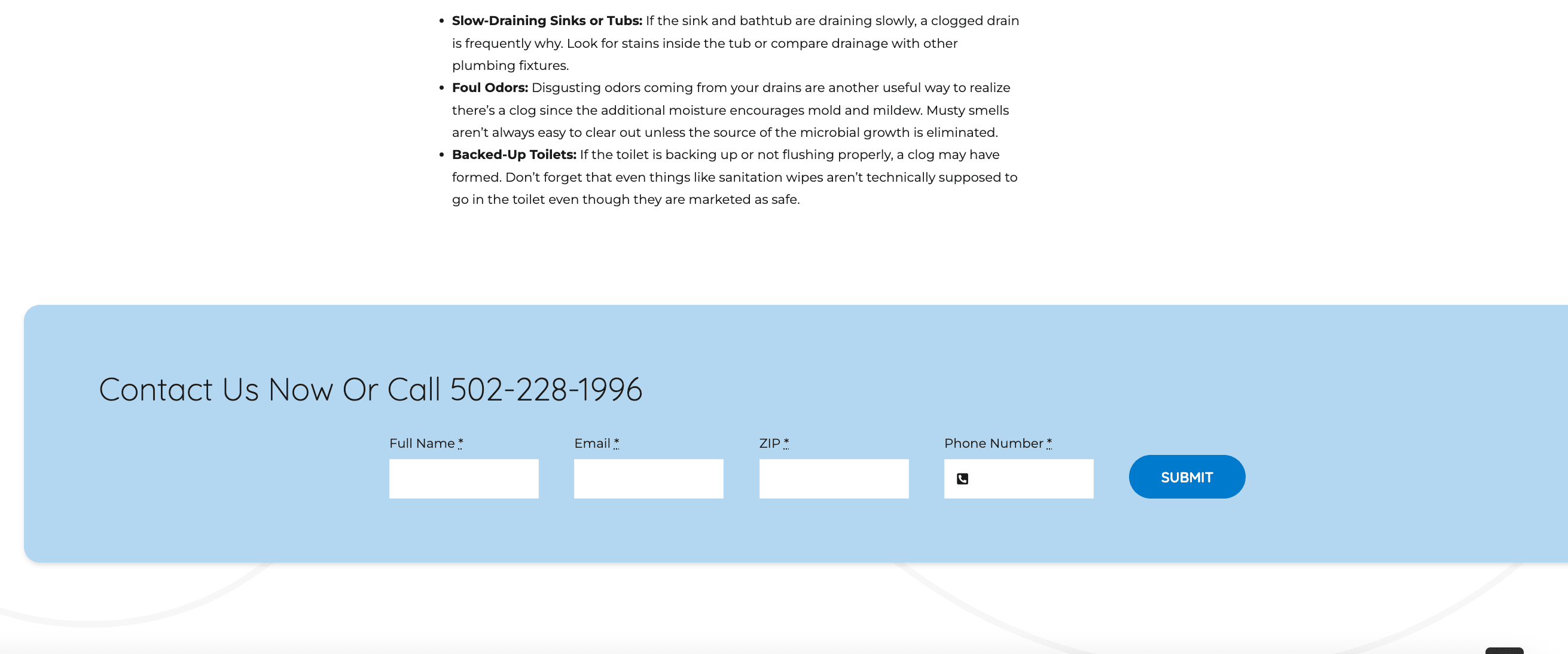
The screenshot below explains why it’s better to hire professionals than to fix the problem yourself. Offering explanations like these helps convince potential clients to choose United Plumbing.
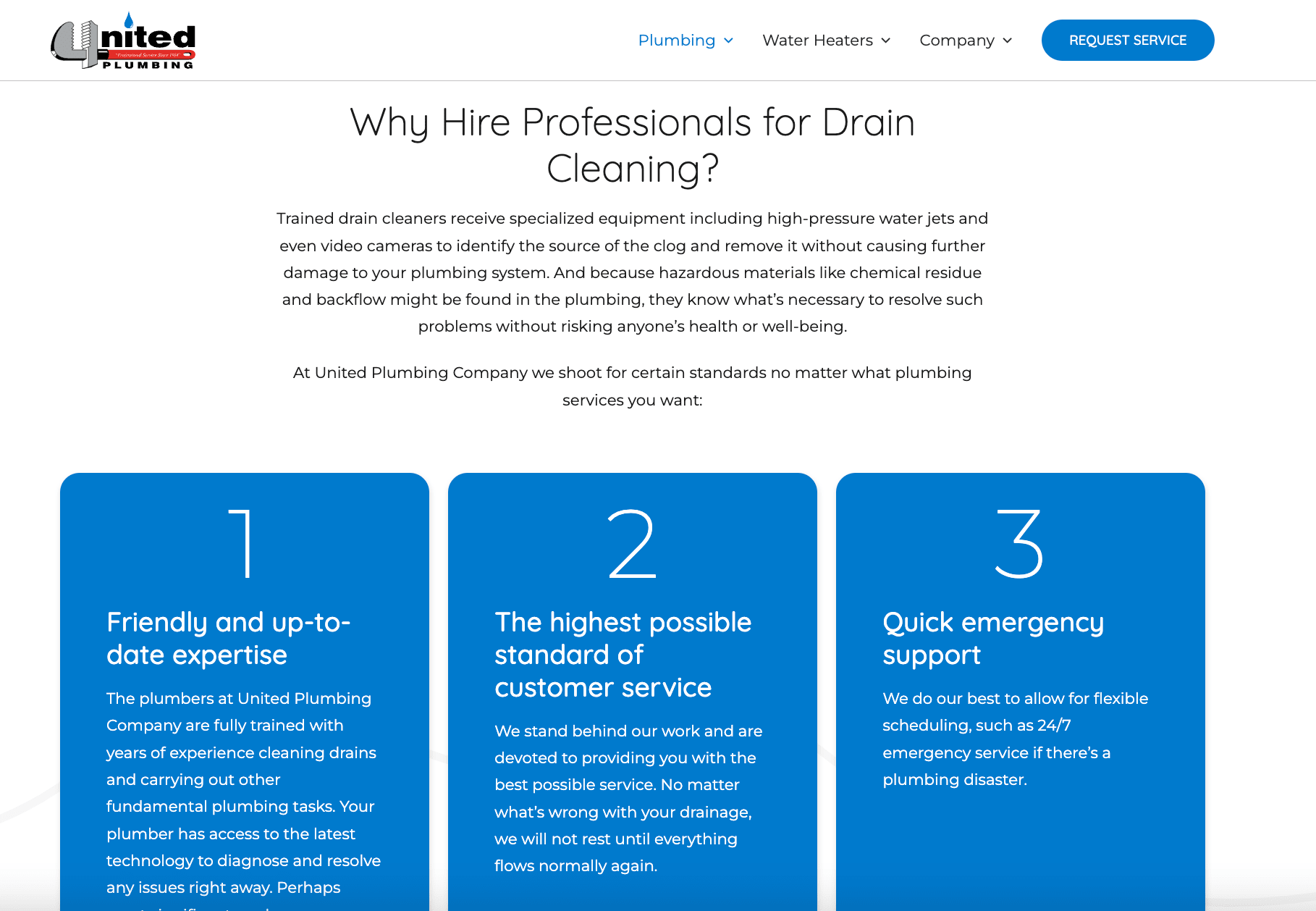
United Plumbing also includes a link to its About Us page to further assure potential clients of the company’s expertise and experience with resolving such issues. Additionally, you can find offer links here. Links like these also help visitors finalize their choice to rely on this company.
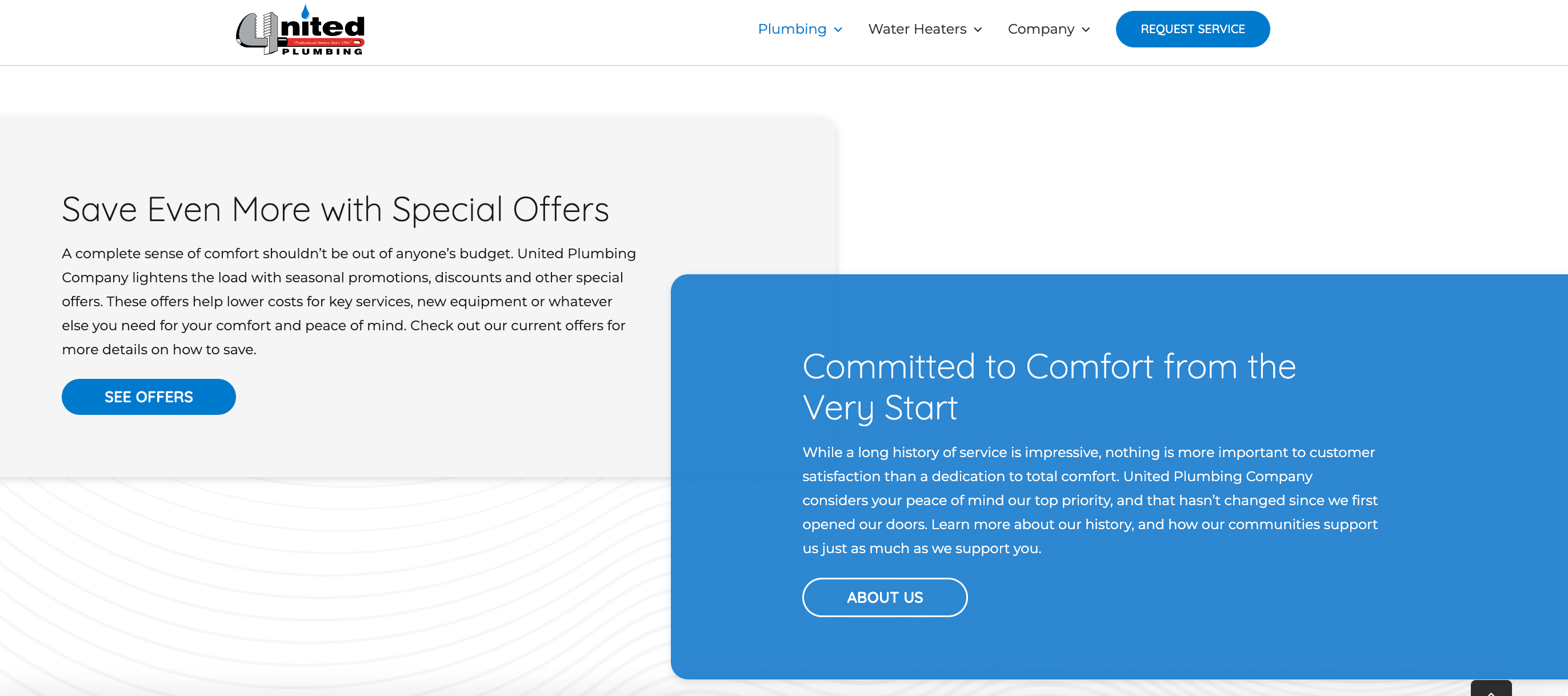
So, the cornerstone of your landing page should address three key elements: the problem, its solution, and the benefits of professional expertise. Of course, it’s worth adding a contact form so that you can easily get in touch with the client to clarify details.
Write blog posts to answer popular questions of your potential clients
Blog posts are another great way to attract potential clients. Informational content usually attracts many visitors and can be more popular than commercial landing pages. For example, blog articles are among the most visited pages on mrrooter.com.
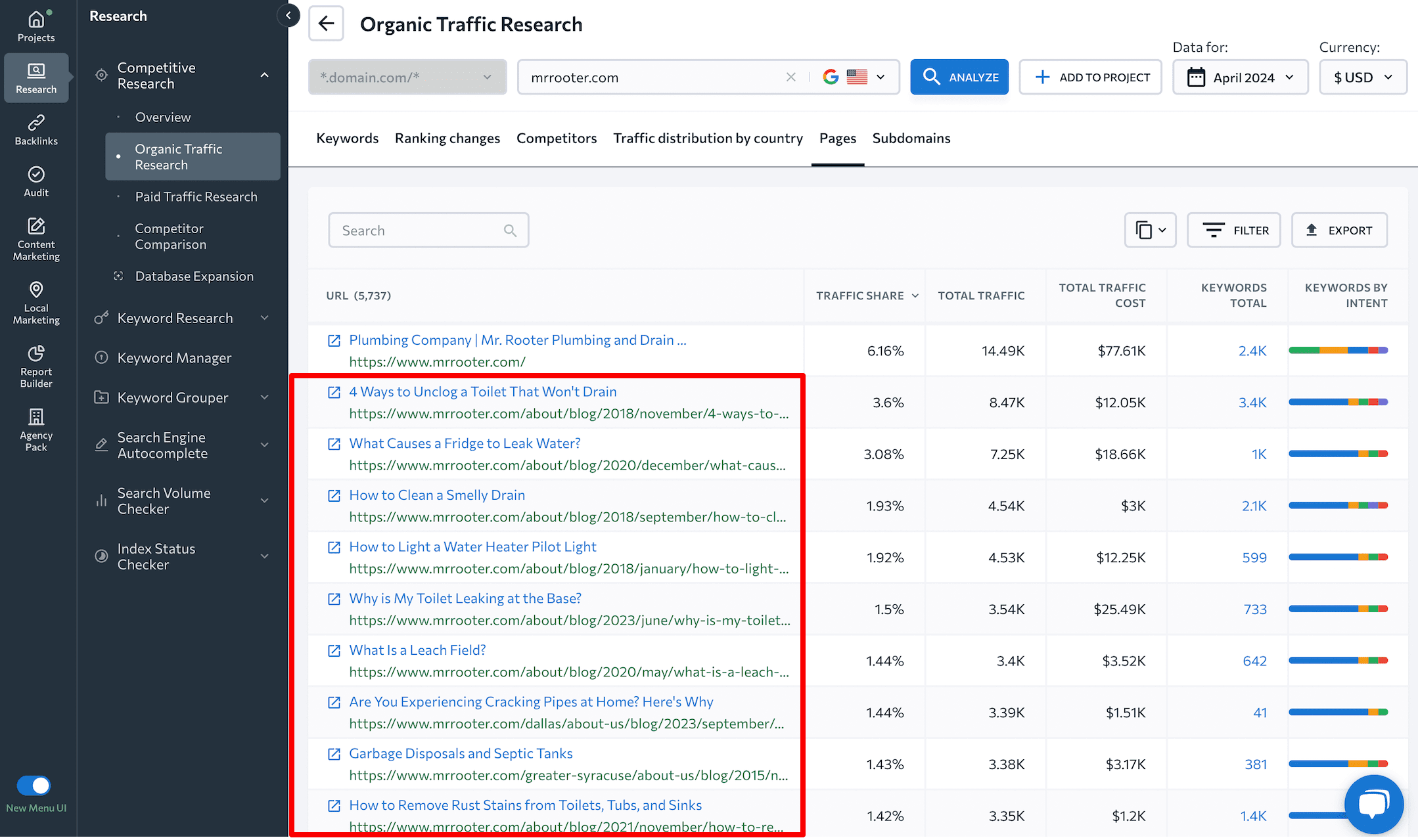
This makes having a blog essential to website promotion.
The main goal of a blog is to answer popular user questions. For example, “what to do with a clogged toilet,” “how to get rid of garbage disposal smell,” “how to remove shower drain cover,” etc.
Research what interests your customers (e.g., through reviews), explore the plumbing blog topics used by your competitors (as demonstrated earlier), and identify what users are generally searching for on Google.
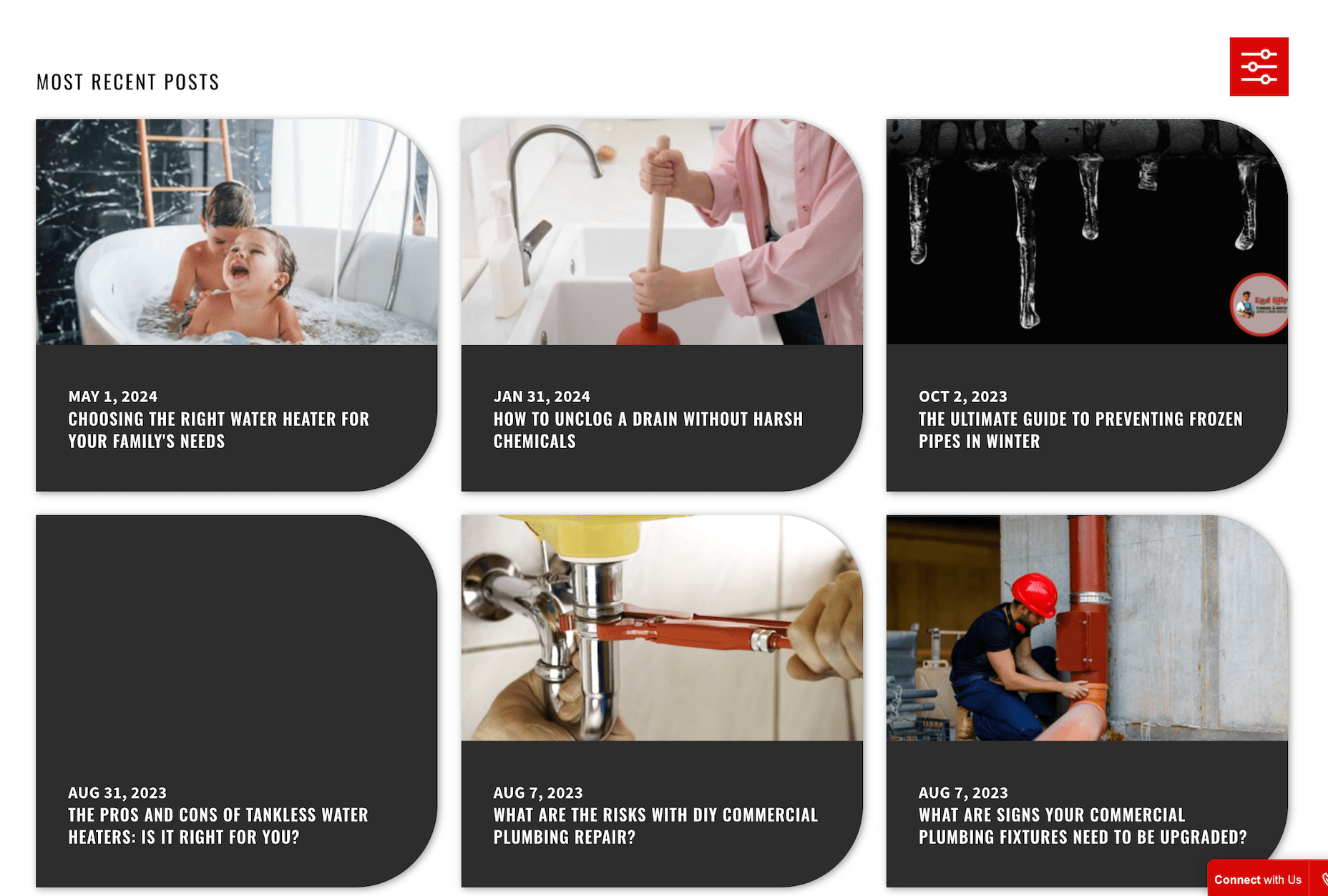
Сreate informative blog posts that provide the answers users are looking for. This approach helps you address the user’s issue and showcase your expertise and professionalism, reassuring clients that they will receive high-quality service.
Demonstrate experience, expertise, authoritativeness and trustworthiness (E-E-A-T)
To ensure Google views your content as high-quality and valuable, which will positively impact your ranking, adhere to the E-E-A-T concept. Here’s how:
Showcase your expertise:
- Let potential clients know about your expertise by creating an About Us page that details your industry experience, work history, and the number of clients you’ve helped.
- Display quality certificates on your website to validate your expertise.
- Add a page dedicated to your team that shares your qualifications and experience.
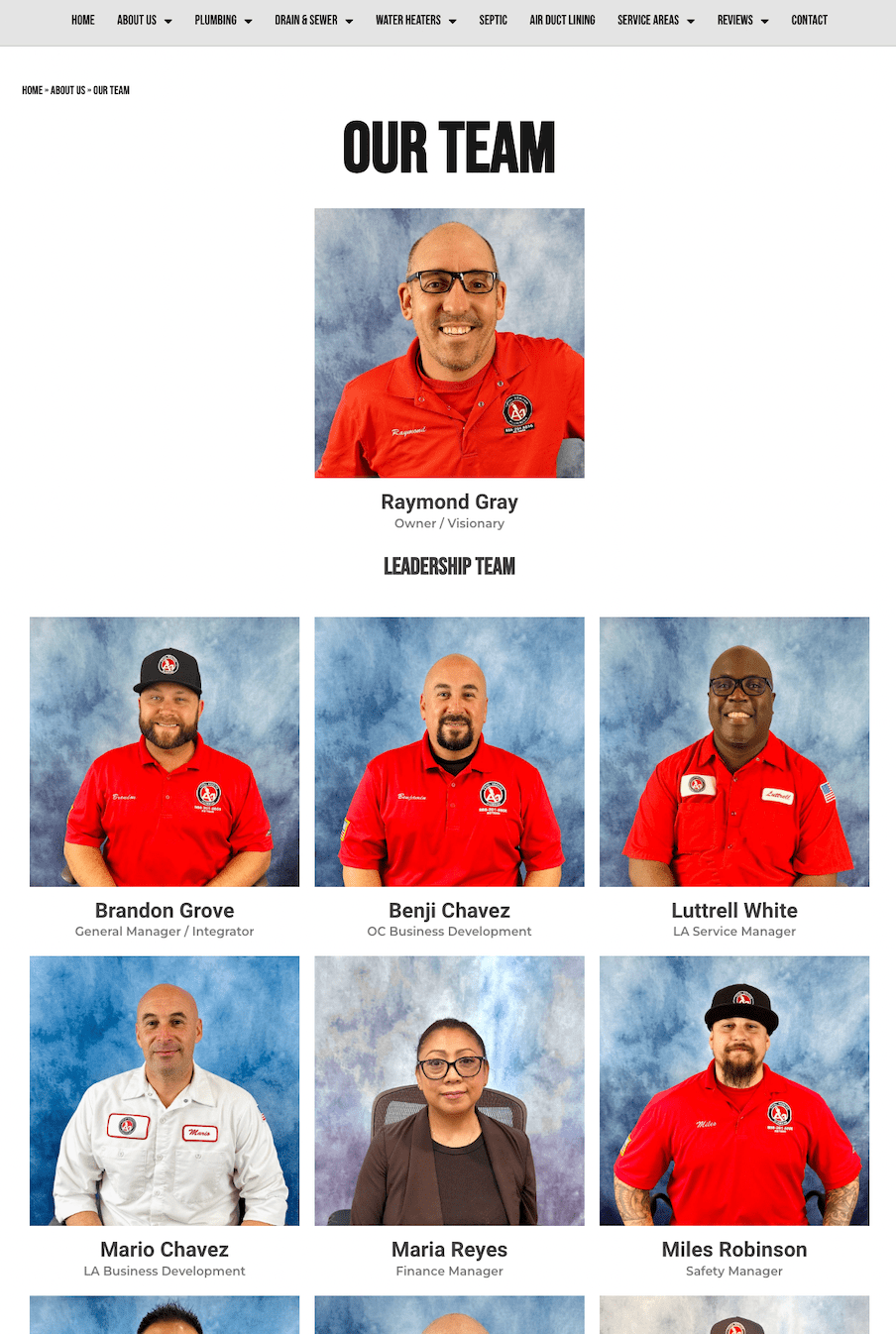
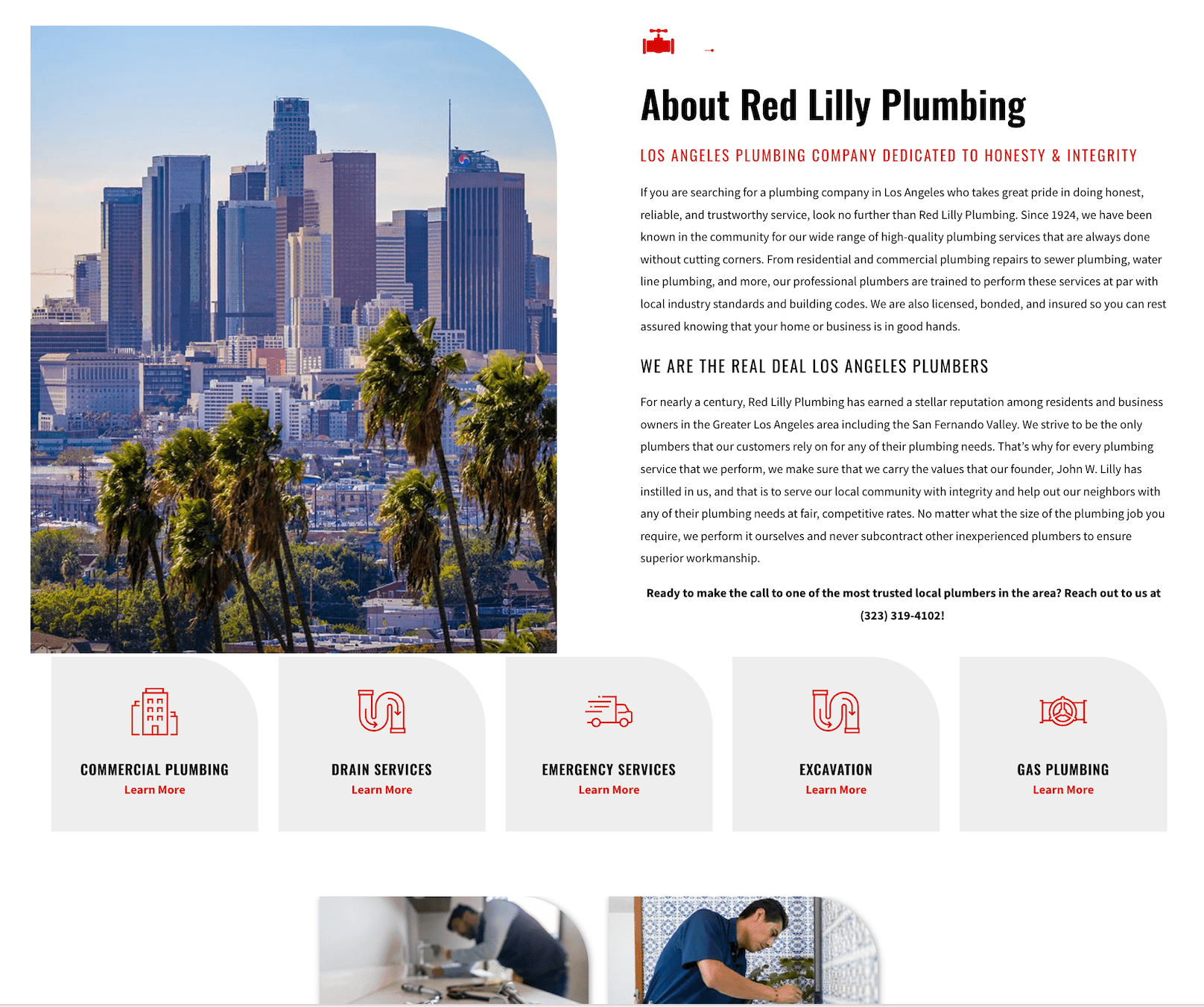
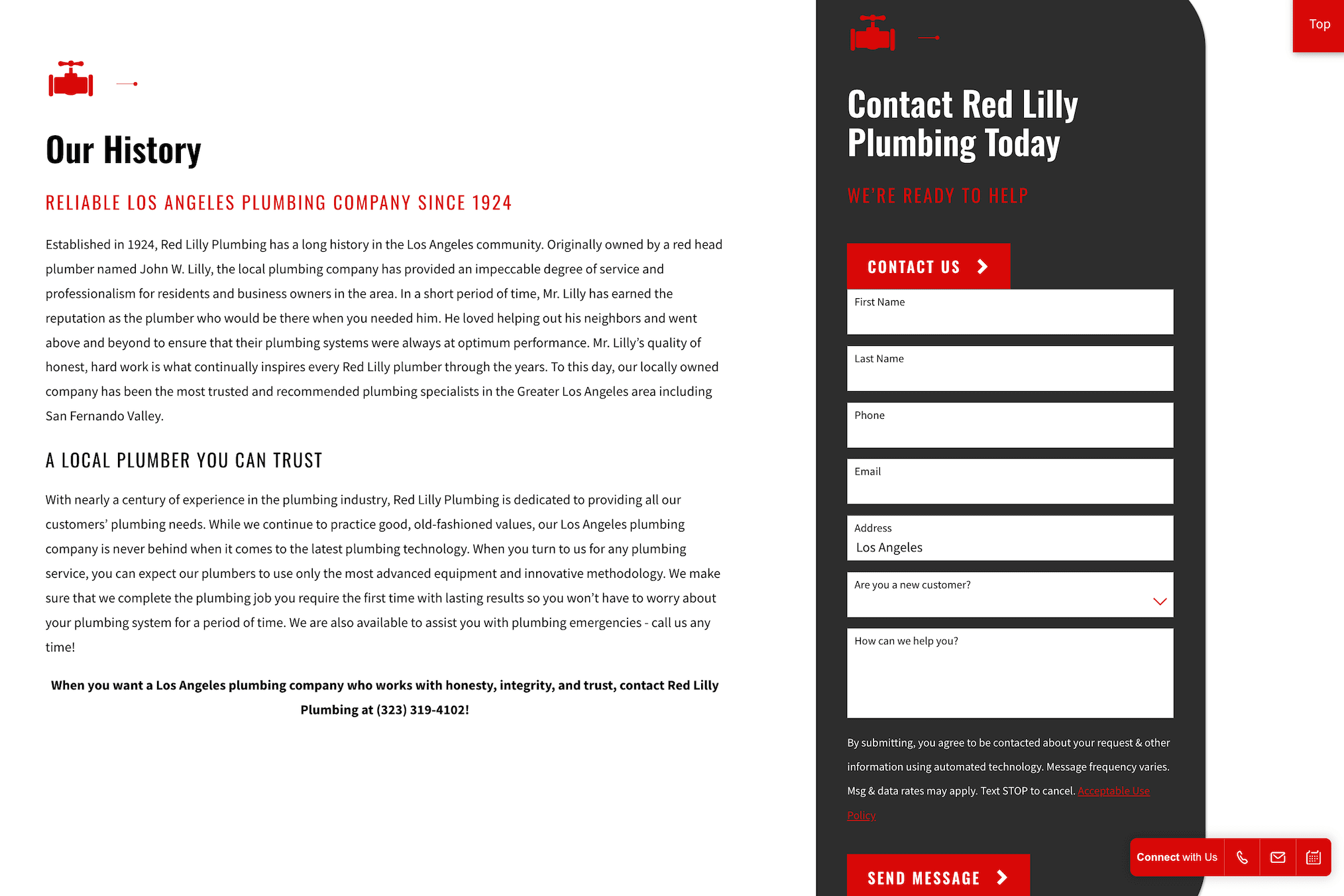
Showcase your experience:
- Provide advice on various plumbing issues in your blog to help solve users’ problems.
- Share personal insights or discuss niche products/services from your perspective.
- Showcase your client projects and successful case studies.
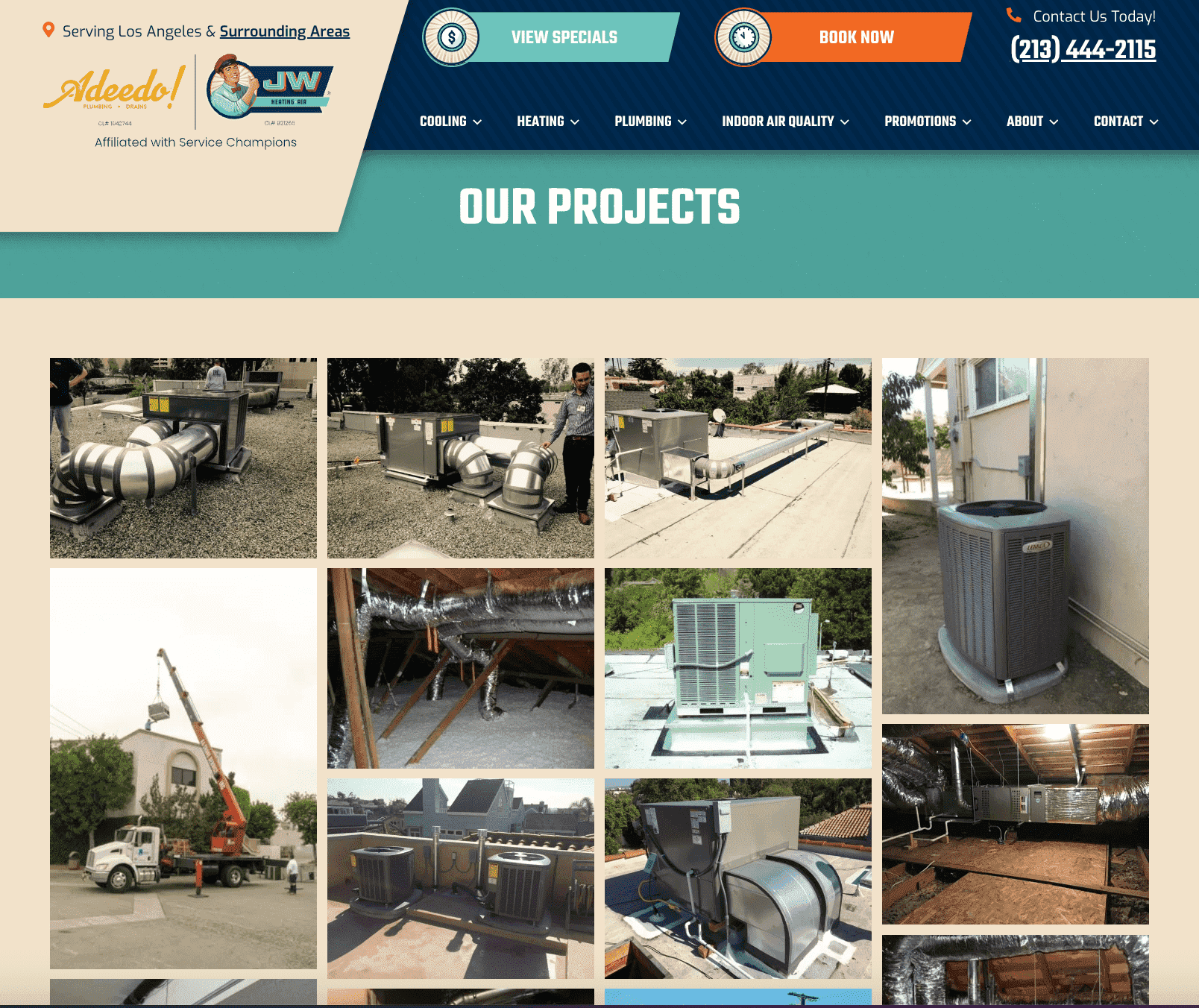
Showcase your authority:
- Get mentions on authoritative websites (we’ll dive deeper into this in the next section).
- Highlight your awards and recognitions on your site, showing what sets you apart as a top provider in your field.
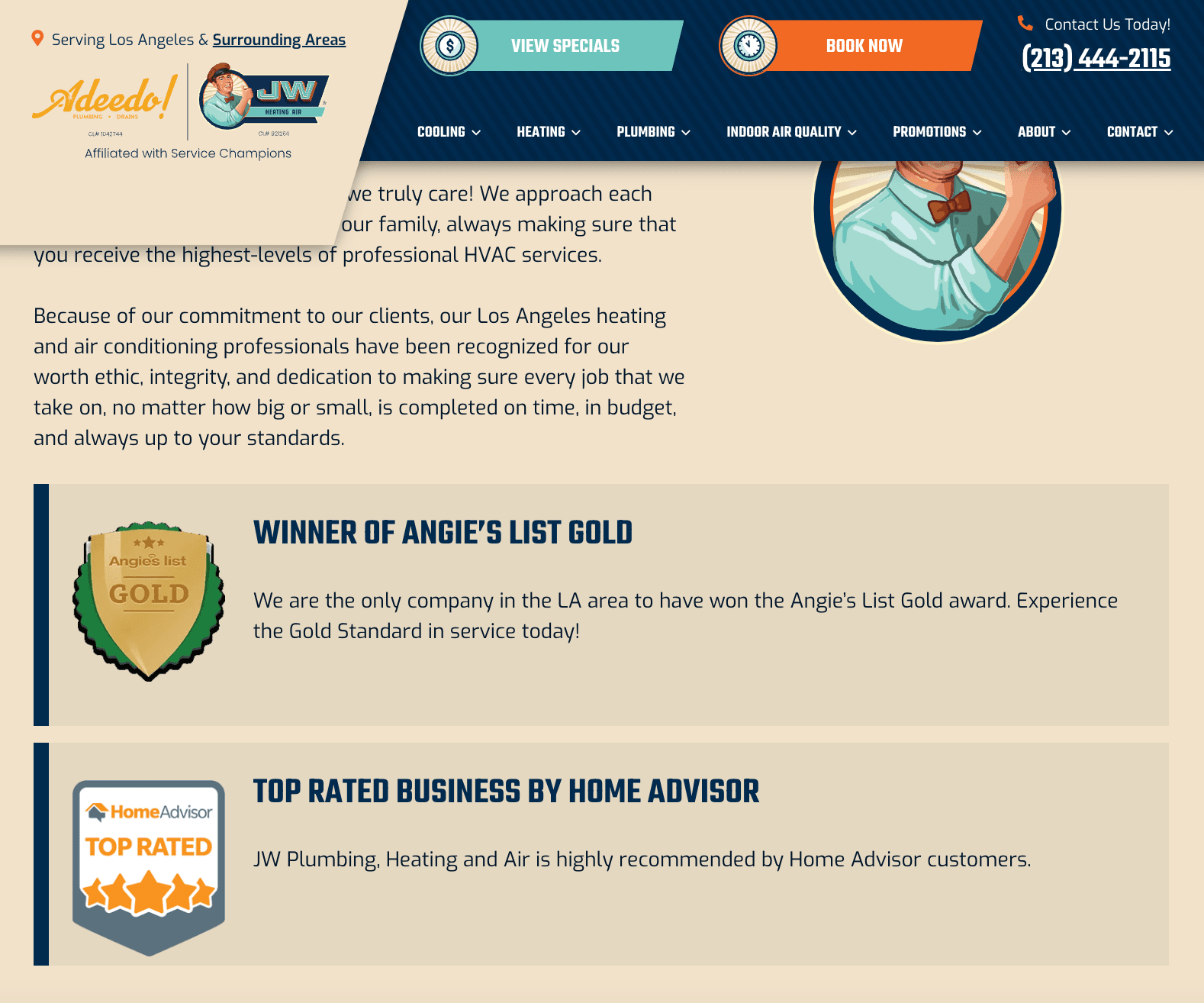
Showcase your trustworthiness:
- Build trust across your website by including key elements such as your company name, contact information with phone number and address, working hours, a feedback form, social media links, an online scheduling form, messaging apps for communication, and online support.
- Show positive customer reviews that confirm your professionalism.
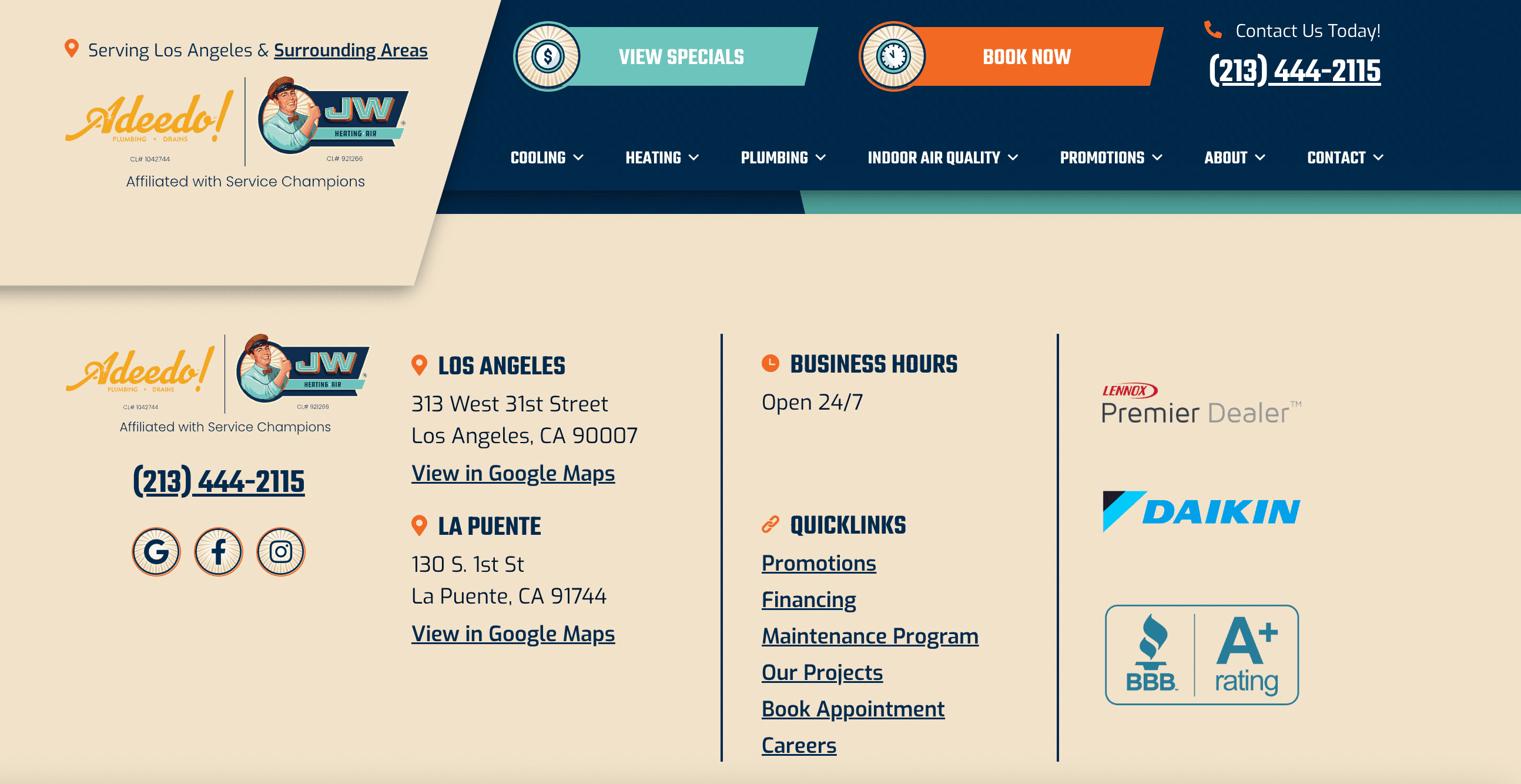
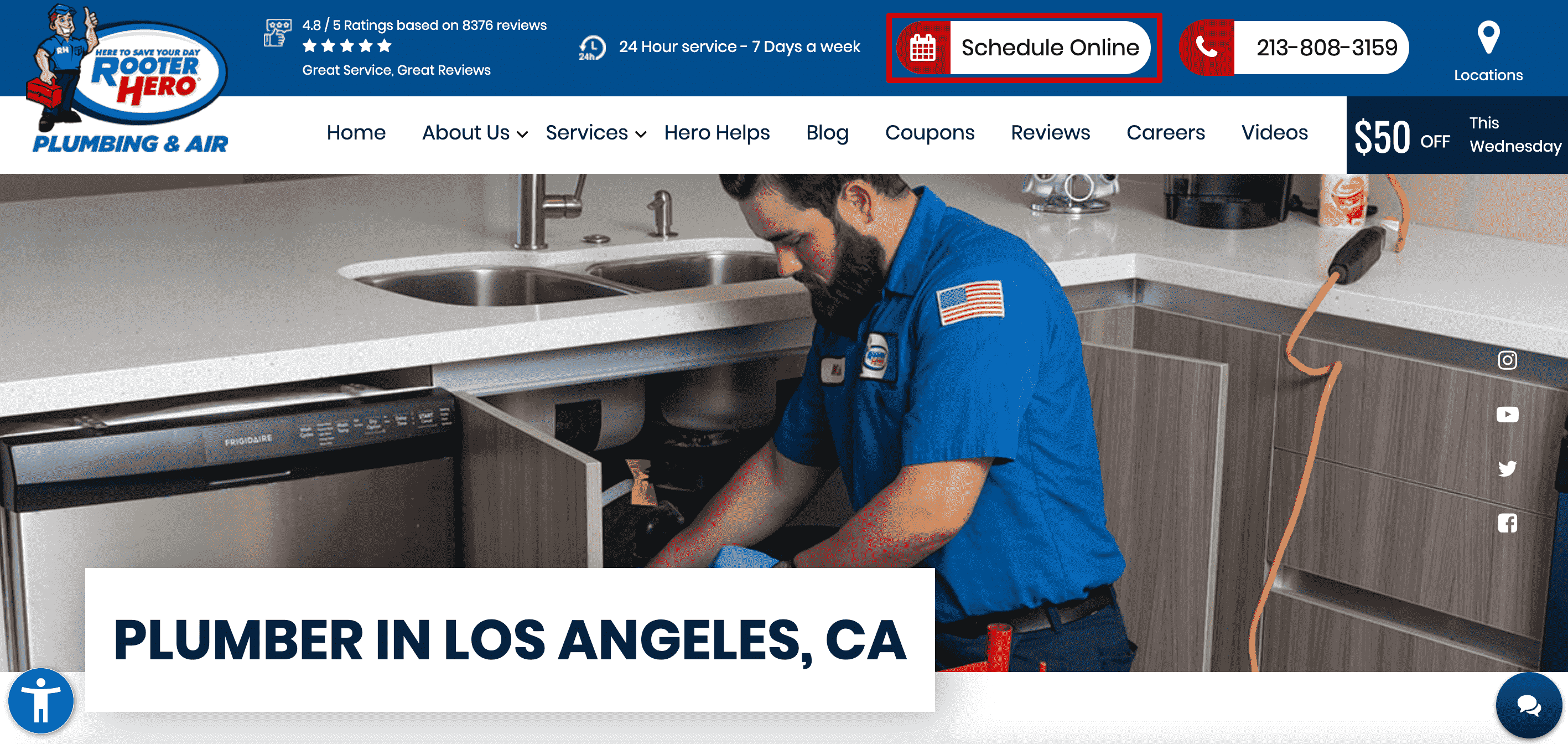
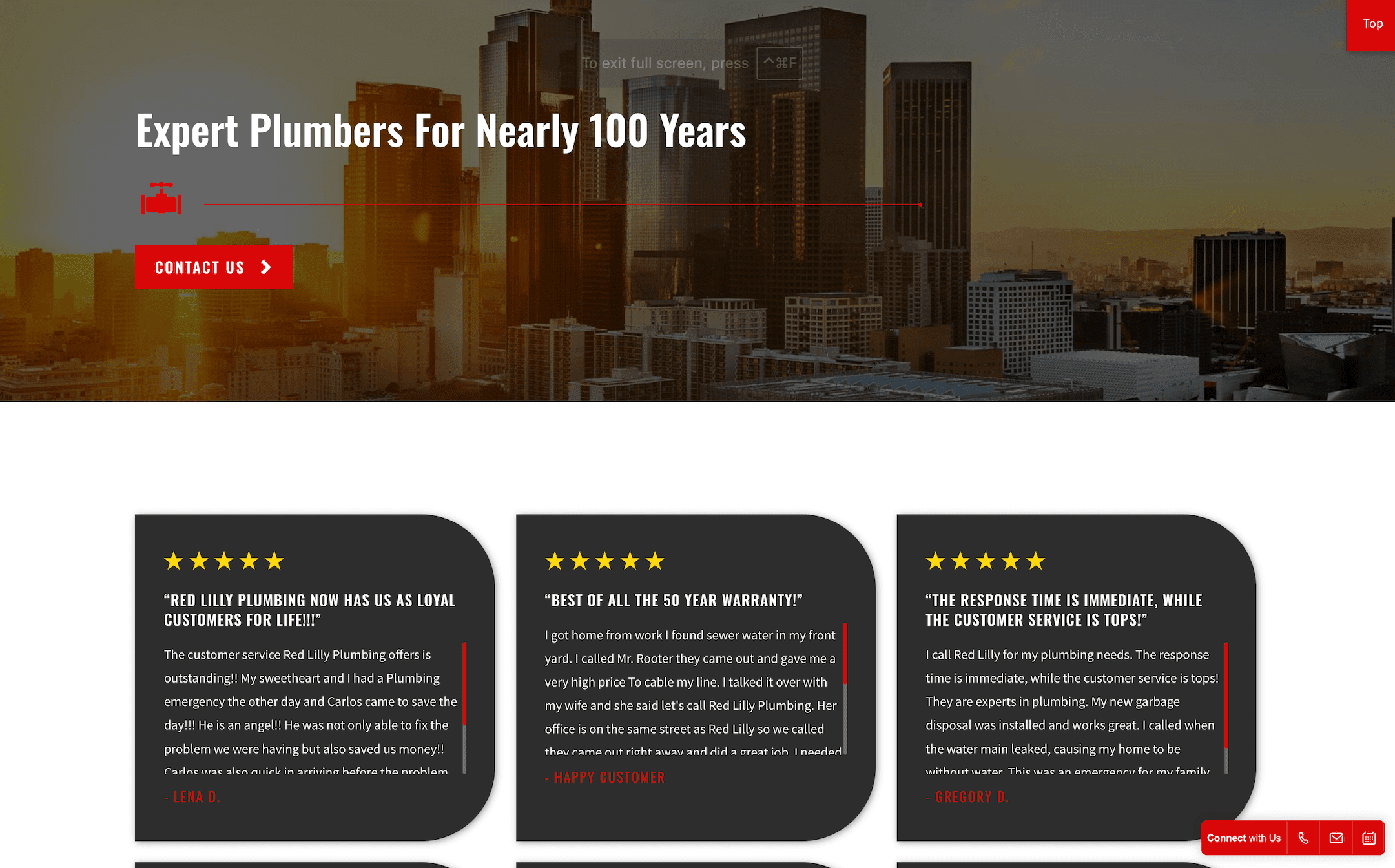
Do on-page SEO
Doing on-page SEO for plumbers involves optimizing page content that affects your website rankings. Here are the key aspects you need to focus on:
- Make sure your URL is SEO-friendly. Your page’s address should be short, descriptive, and evergreen (e.g., without years, numbers, or variables). Plus, including the target keyword in the URL is a good practice.

- Optimize your title and meta description. The title appears in the browser tab and search engine results, giving users a quick idea of the page’s content. The meta description is a brief summary of a page’s content that also appears in search engine results below the title. Include your focus keyword in the title and craft a compelling and engaging description to entice users to click. Ensure the lengths of the title and meta description fall within the recommended parameters (55-60 characters for titles and 155-160 characters for descriptions). For more information, read this guide on titles and meta descriptions.

- Check your headings and optimize them. Headings help searchers understand your content hierarchy and promote a positive user experience. Avoid overly long headings, maintain a proper heading hierarchy (for example, make sure that your <h2> is not followed directly by an <h4>), and include the focus keyword in your <h1>.
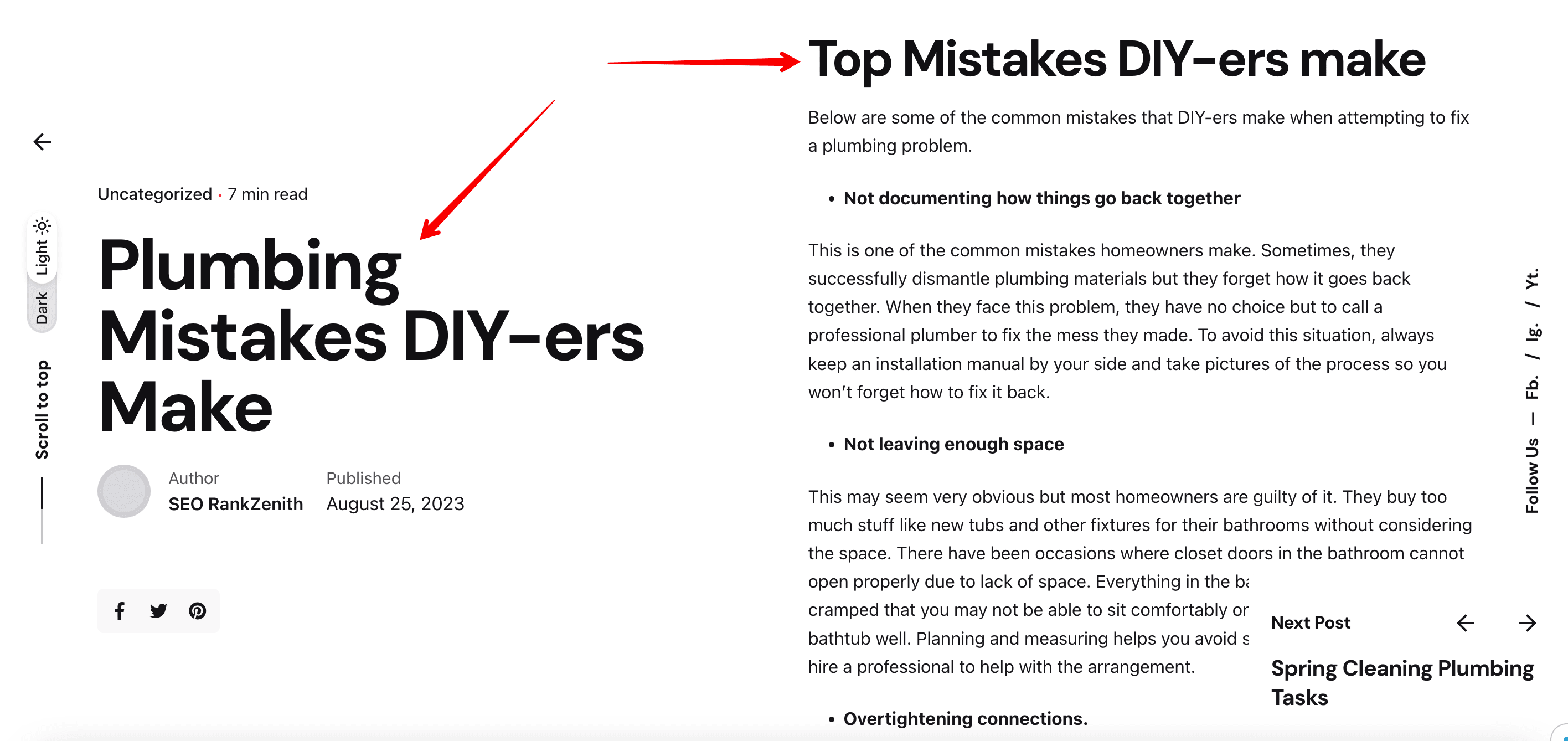
Off-page SEO
To increase the authority of your website, you need to get high-quality backlinks (links from one website to another). These act as a vote of confidence, indicating that the linked content is valuable and relevant.
Backlinks should come from relevant, authoritative sites. Your link-building efforts will otherwise fail in achieving the desired results. Plus, pay attention to your anchor text (the descriptive text of the link). It should not be spammy, and should ideally include a keyword that mirrors the page it is linking to (though not always) and be relevant to both pages.
There are many ways to get valuable links. Below are the most popular and effective methods:
- High-quality content to get organic backlinks. This is definitely the best way to get mentions. Organic backlinks appear naturally in an external website’s content without your involvement. To attract such backlinks, create engaging, shareable content with the potential to go viral, such as studies, infographics, and interviews.
- Directory submissions. Even though we already discussed the importance of listings for the plumbing business earlier, it’s worth mentioning here as well. When you create a profile in a directory, you leave a link to your site, which creates a backlink to your website.
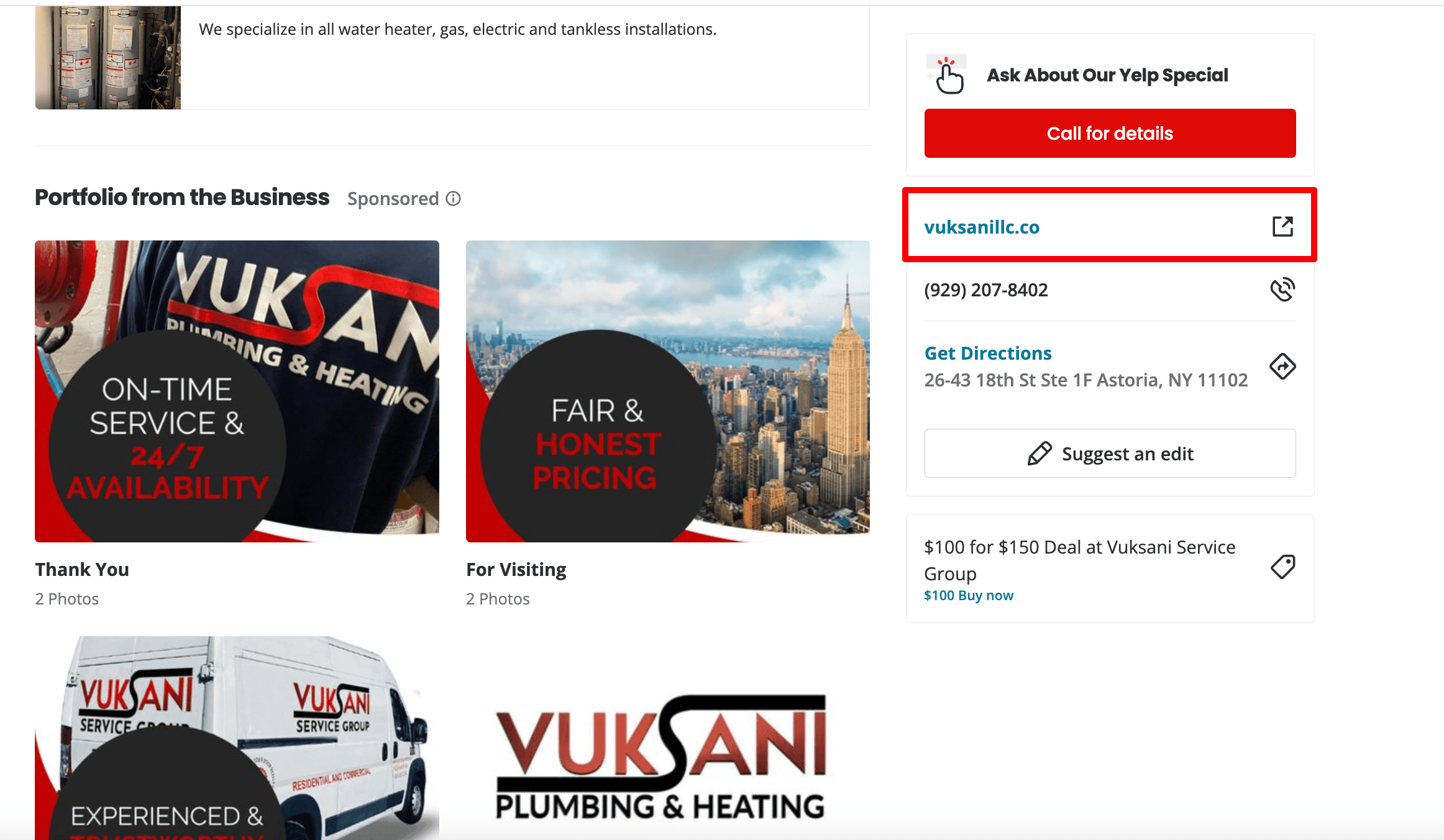
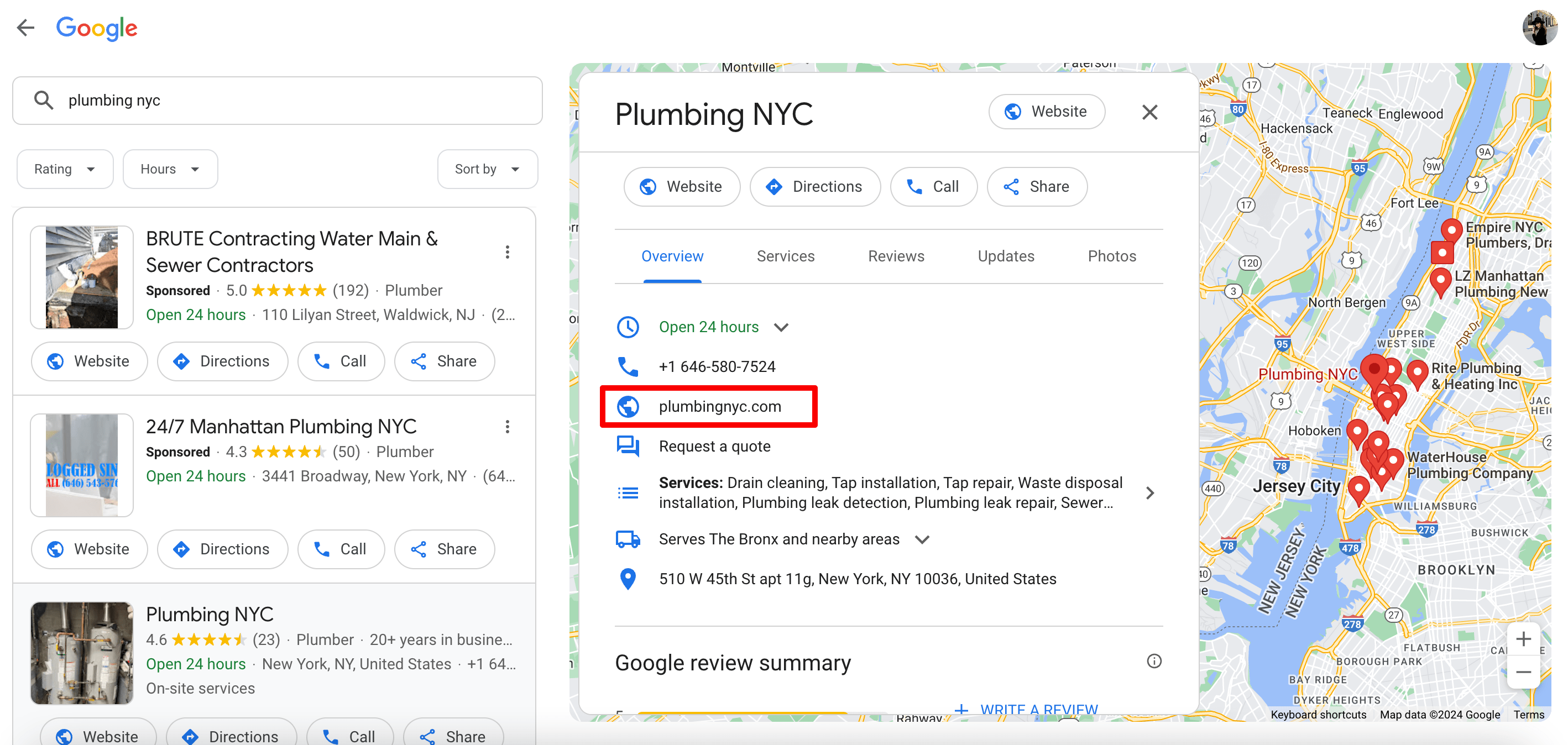
- Guest posts. Write articles for other websites and include a backlink to your own. This benefits you by creating a backlink and benefits the other website by providing high-quality, valuable content. It’s a win-win situation. The challenge of guest posting lies in negotiating with other websites to publish your content. We explain how to do this step-by-step in our guest posting guide.
- Social media profiles and other platforms. Add a website link to Instagram, Facebook, YouTube, and any other platforms your company uses. All these platforms are authoritative resources from which a backlink would be valuable for your strategy.
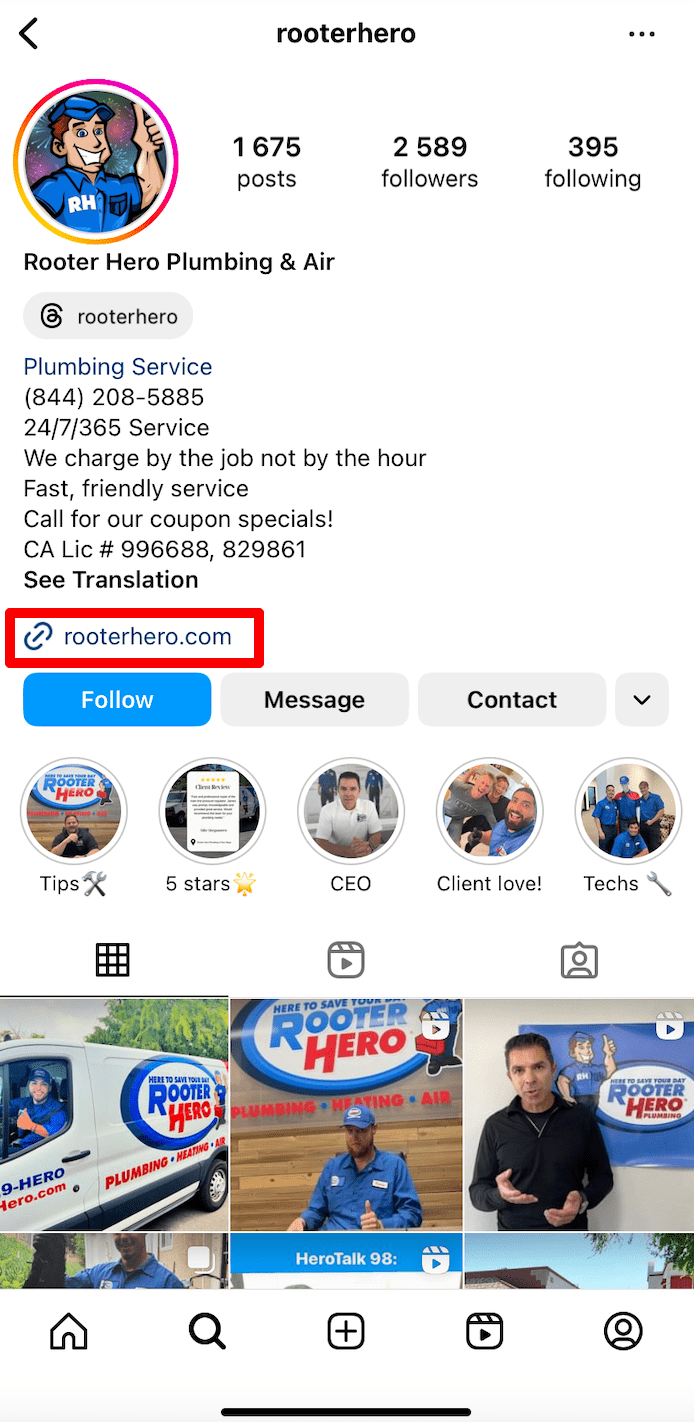
Sure, these aren’t the only ways to build links. More advanced methods like digital PR or using HARO can also work well. For these, it’s best to consult the plumbing SEO experts.
Note: Avoid using link-building methods that are against Google’s guidelines. Any links intended to manipulate rankings in Google Search results may be considered link spam. For example, if you buy or exchange backlinks, Google can apply penalties, lowering your site’s position in SERPs and reducing the overall amount of organic traffic.
To uncover your off-page SEO competitors’ strategies or analyze your own backlink profile, you can use the Backlink Checker. This tool provides comprehensive backlink data, including a Domain Trust score, a list of backlinks and referring domains, top anchor texts, and much more, helping you make informed decisions.
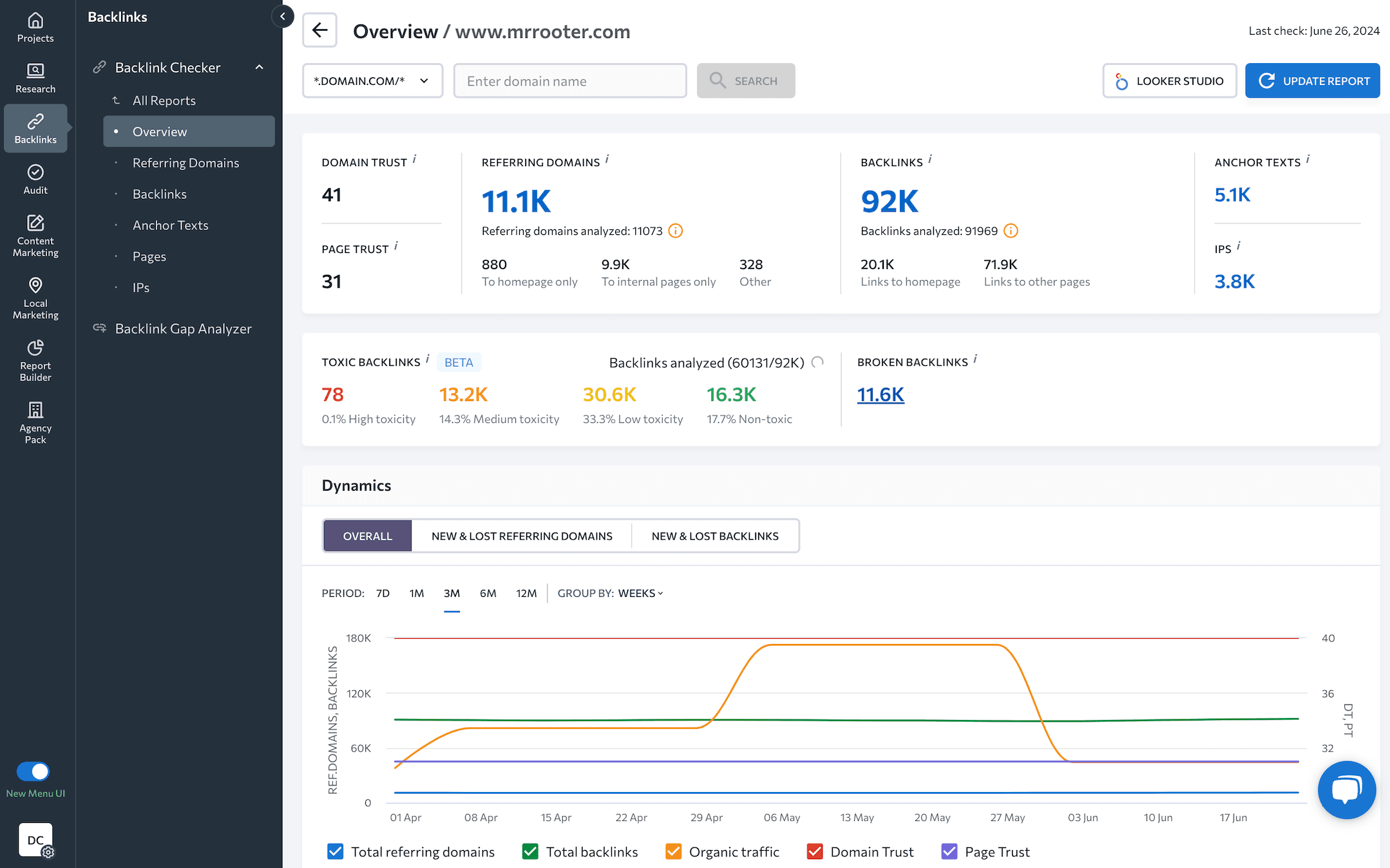
Technical SEO
The next important part of plumber SEO is the technical optimization of your website. Since people often search for plumbing services with their smartphones, you should focus on mobile usability. But don’t forget about the other essential aspects of technical SEO either.
Work on mobile SEO
Websites that provide a seamless and responsive experience on mobile devices are more likely to retain users, leading to lower bounce rates and higher engagement. Here are some mobile-friendly best practices to follow:
- Make sure your website works well on different devices and screen sizes. This keeps your content clear and readable on small screens. You can quickly check this in the Google Chrome browser by using the Inspect tool and switching to the device toolbar.
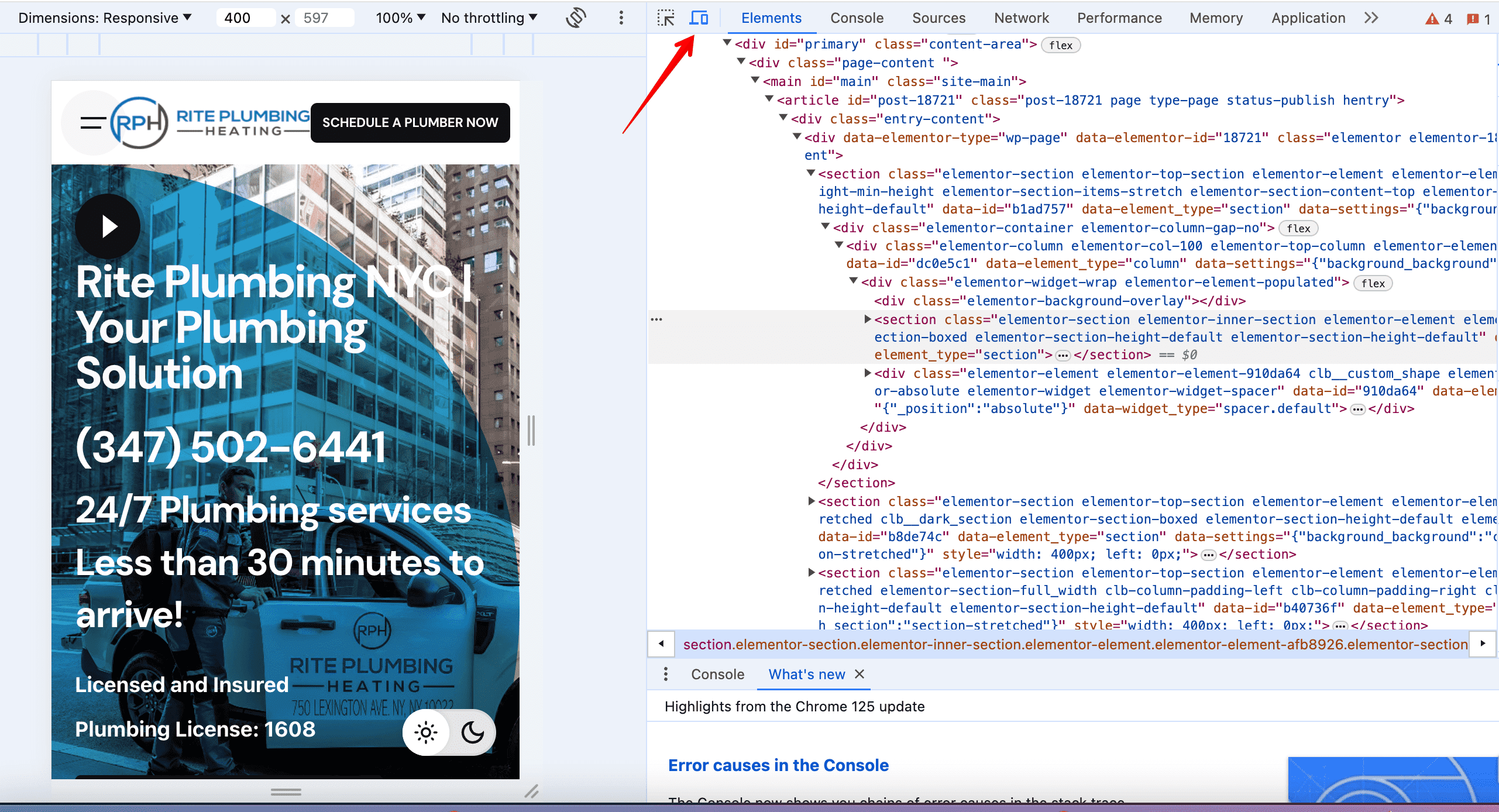
You can also use SE Ranking’s free Mobile-Friendly Site Test tool, which evaluates your site’s mobile-friendliness based on key technical factors (such as page speed) and usability factors (including viewport settings, text size, touch elements, and on-screen content).
- Ensure all elements like buttons and forms are visible and clickable on different devices to make it easy to engage with fingertips.
- Choose a mobile-friendly font that does not compromise text readability.
- Compress images and adjust their size to match the screen dimensions.
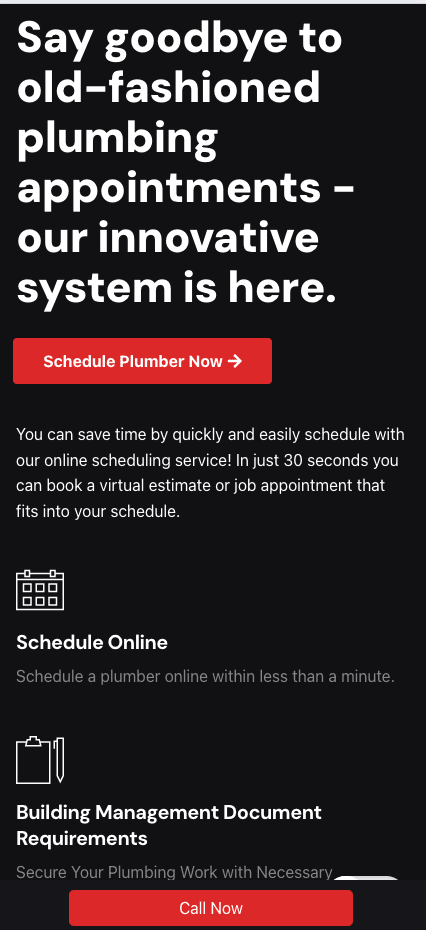
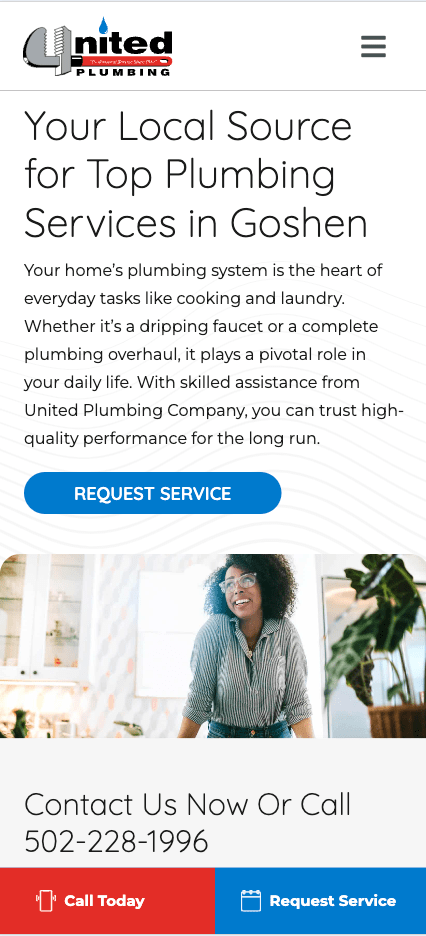
To learn more, refer to our mobile SEO guide.
Consider user experience
Keep your website user-friendly to prevent visitors from leaving and looking for a better alternative. Make their experience seamless and engaging. Here is how:
- Ensure fast loading times: All elements on the page should load quickly.
- Keep design clean and visually appealing: Create intuitive menus.
- Make navigation easy: Do this by improving the website structure. Categorize your web pages and use breadcrumbs to help users track their current location on the site.
- Enable quick-click accessibility: Make all your important pages with services, contact info, and blog posts accessible from the homepage within a few clicks.
- Implement the following: Alt text for images, proper color contrast, and keyboard-friendly forms.
Ensure that search engines can crawl and index your website efficiently
Efficient crawling and indexing by search engines are crucial because they ensure your website’s content is discovered, understood, and ranked appropriately. To achieve this, you should work on a good website structure and optimize both the sitemap and robots.txt file.
- Easy navigation is important for both users and search engines. Logically categorized content, simple navigation, optimized and natural internal linking simplifies crawling for bots.
- A robots.txt file tells search engines how to crawl your website and is located at www.yourwebsite.com/robots.txt. Confirm that search engine bots can access it and that important pages aren’t blocked from crawling. To learn more about working with robots.txt files, read our guide. If you don’t have a robots.txt file yet, create it manually or use a robots.txt generator.

- The sitemap (a list of all the website URLs that crawlers should be aware of) plays a crucial role in helping search engines discover and index your pages, especially on larger websites. Ensure that your sitemap is valid and doesn’t include non-indexable pages (which don’t appear in the search results) or pages returning a non-200 status code. For more information, refer to this sitemap guide.
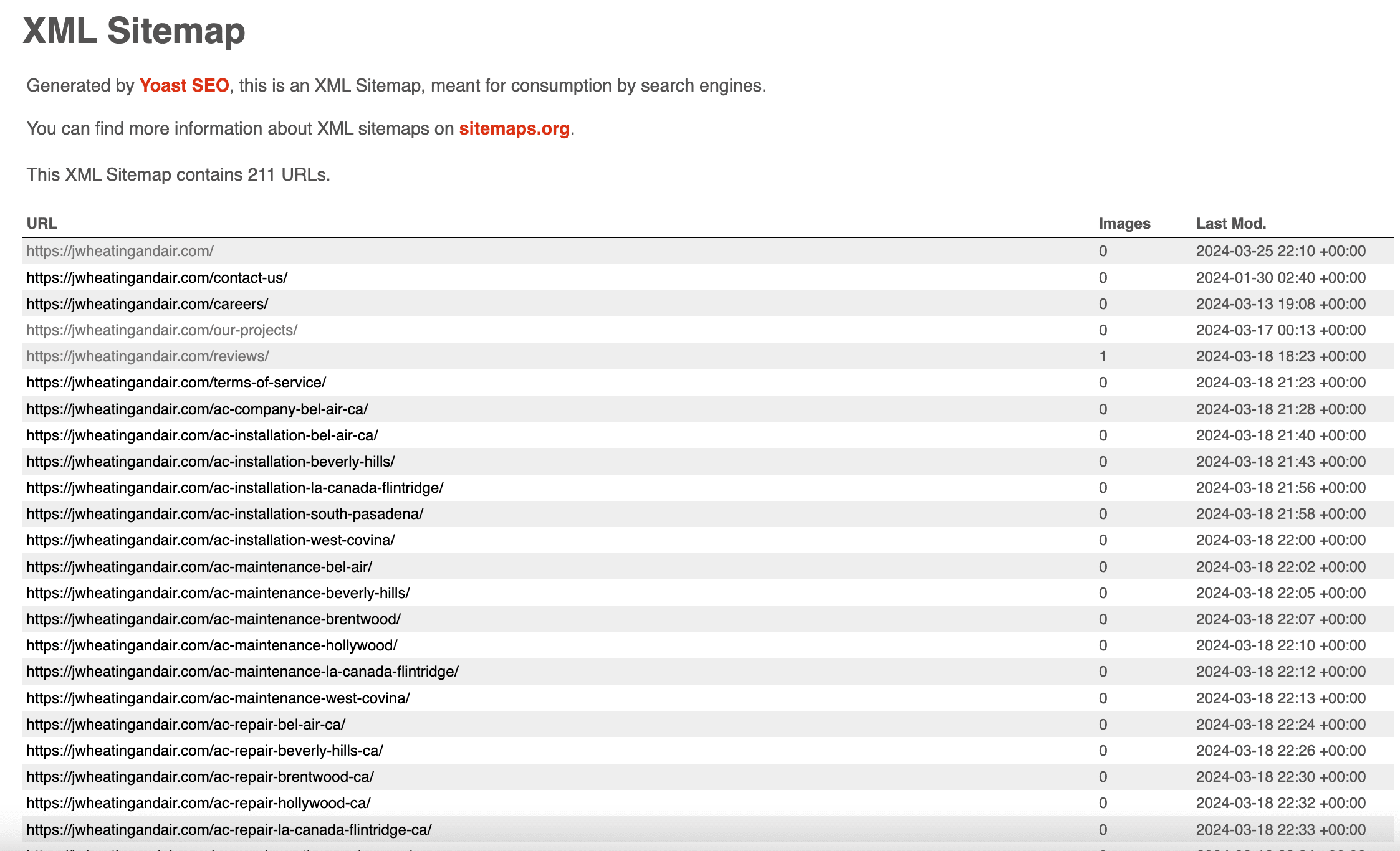
Conduct regular website audits to identify and fix technical issues
Another important point to remember is to continuously monitor the technical health of your website. Errors and issues can arise for many reasons, and it’s crucial to detect them in time so they don’t affect your site’s search rankings. Website audit tools come in handy here, as they regularly scan your pages for different types of SEO problems.
For example, SE Ranking’s Website Audit provides a comprehensive health report for your website based on 120+ technical parameters, including broken links, duplicate content, crawl errors, missing images, media asset accessibility, and many more. It also provides tips on how to fix these issues.
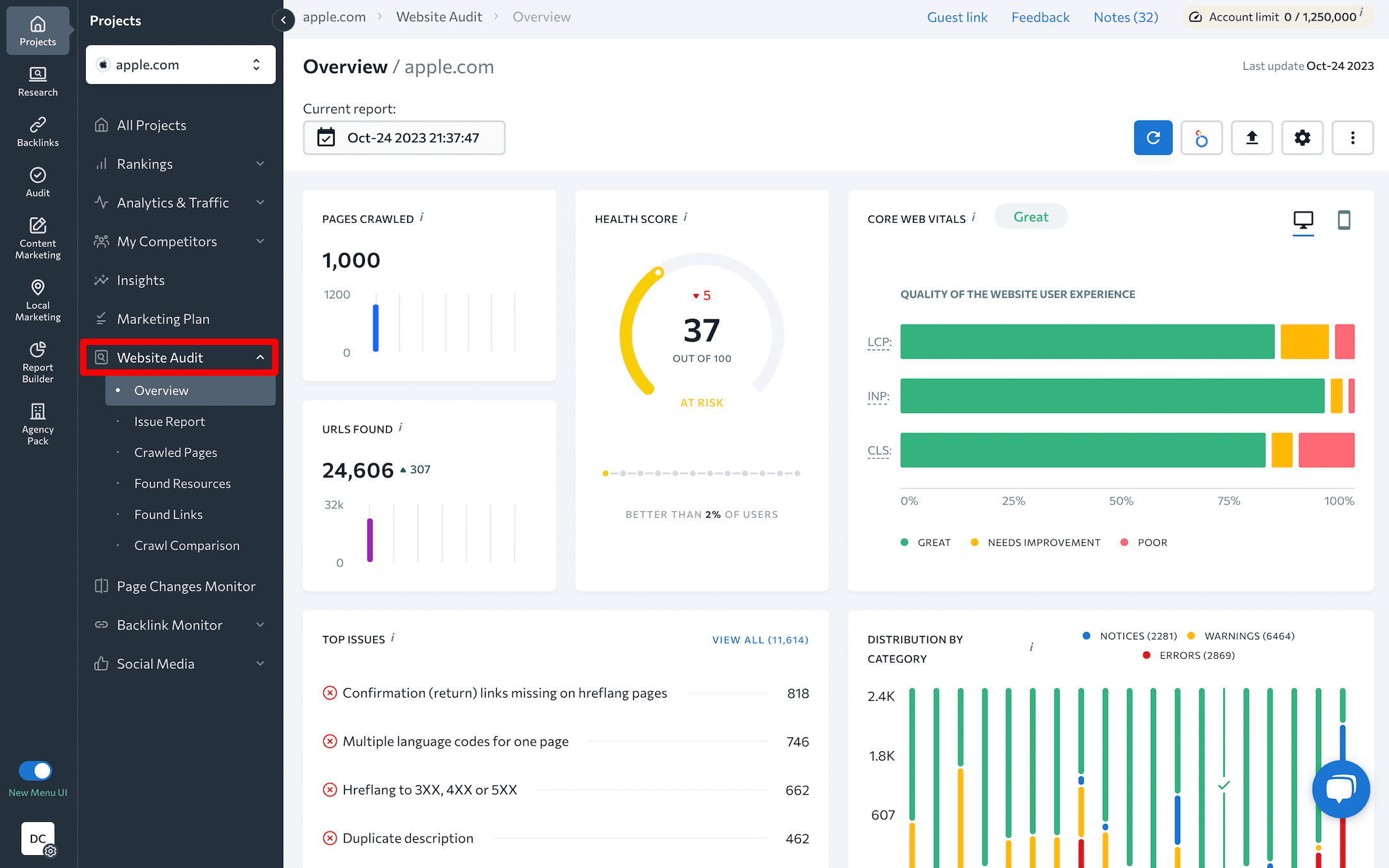
SE Ranking’s Website Audit also lets you set audit schedules and customize crawling rules.
Start by fixing the top issues. Keep an eye on your website’s health as you fix each one. Note that the higher the score, the better. For more details on how to conduct a full website audit, check out this guide.
Tracking SEO progress
Without tracking your SEO progress, you won’t know how to move forward to improve your rankings and attract more clients. To stay on top of your achievements, use specialized tools that provide detailed reports on traffic, rankings, user behavior, and more.
Connect your website to Google Search Console to monitor your organic performance
Google Search Console (GSC) is the main webmaster tool that offers insights into your site’s organic performance. It includes data on:
- Clicks, impressions, CTR, and keyword positions.
- URLs on your site that have been crawled and indexed by Google.
- Website loading speed, interactivity, and visual stability.
- Security issues and manual actions.
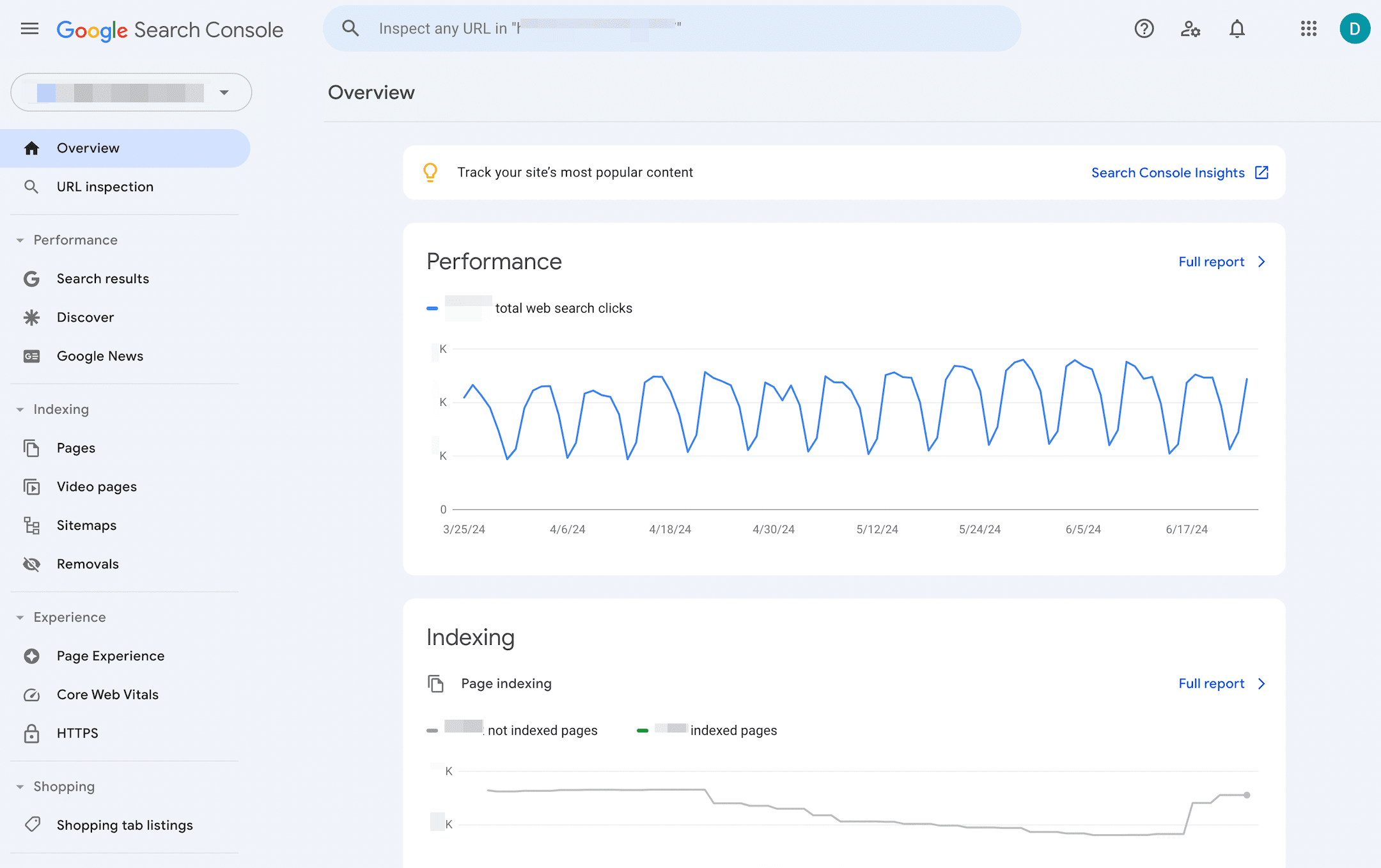
This data can help you make the right decisions when taking further steps toward website optimization.
To learn how to connect your website to Google Search Console, follow the steps outlined in this guide.
Use Google Analytics to track website traffic and conversions
Google Analytics (GA4) is another popular tool that helps with your SEO efforts. Its core purpose is to help you track website traffic, user behavior, and page-specific performance.
The key metrics for you are organic traffic and conversion rate. Organic traffic indicates how many visits your website receives through SEO efforts. The conversion rate measures the percentage of visitors who complete a desired action on your site, such as submitting their contact details or booking a plumbing service.
To view GA4 organic traffic data, go to the Traffic Acquisition report under the Acquisition section and look at the Organic Search option in the table.
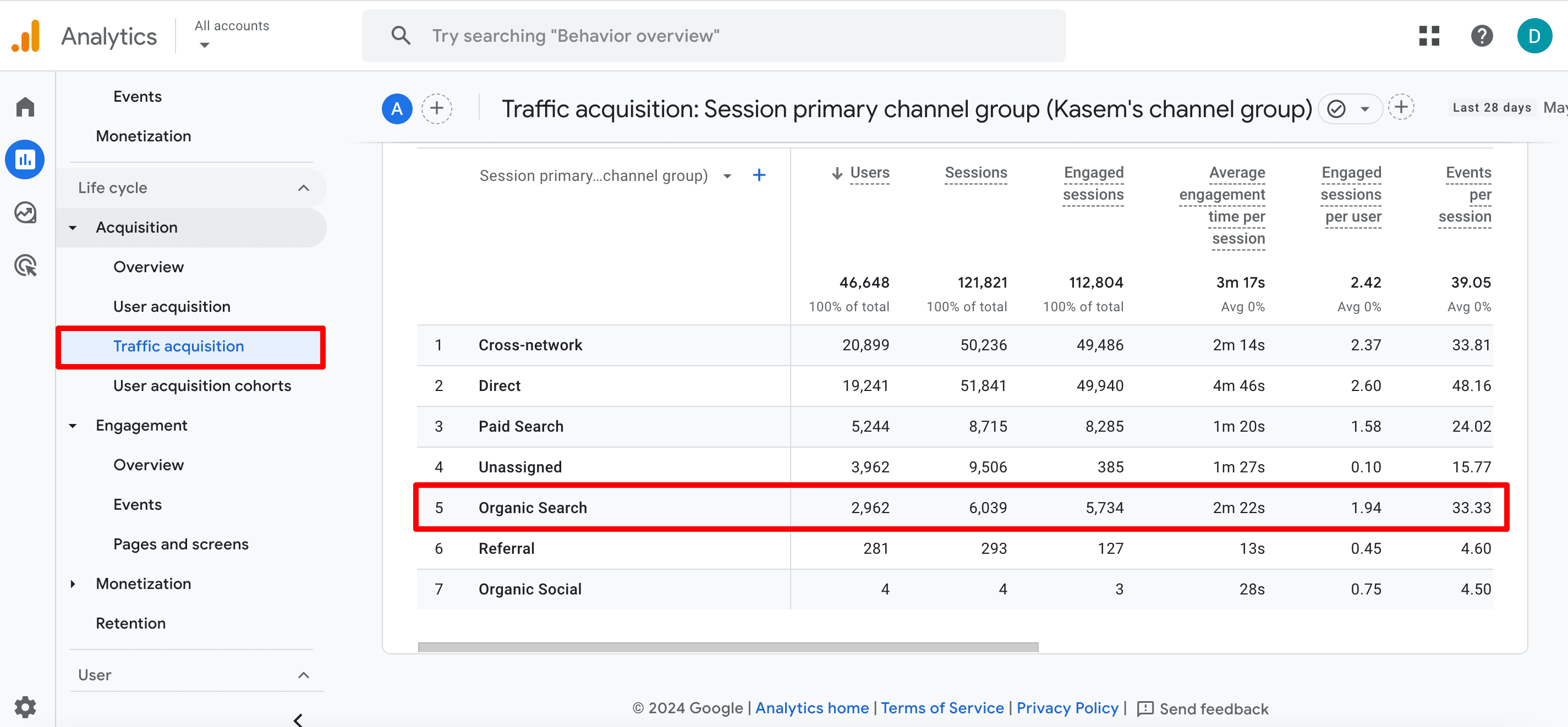
To track conversions attributed to SEO, navigate to Acquisition ▶️ User acquisition. In the Key events column, select the desired action and then review the Organic Search row.
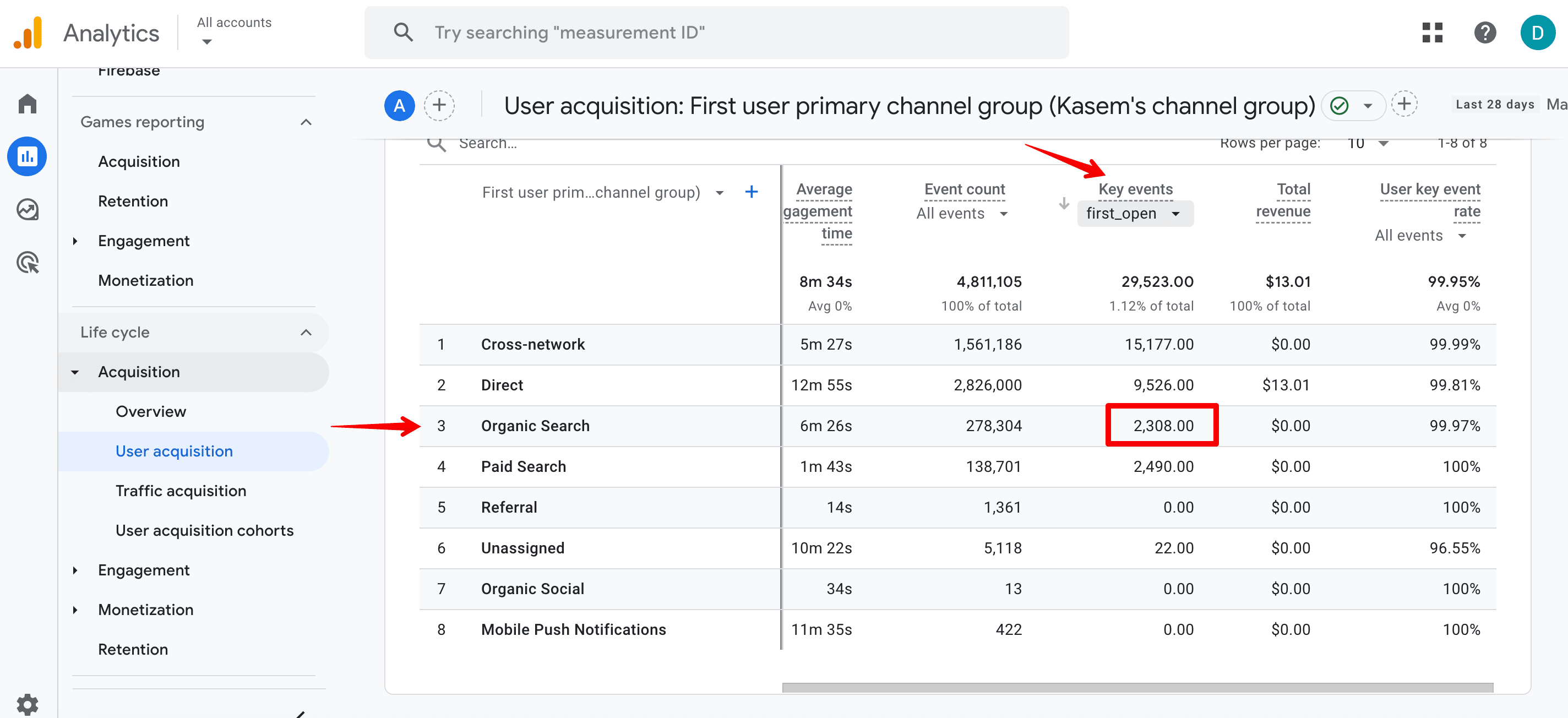
There are several methods for setting up Google Analytics for your website, each of which is described in this guide.
Check your rankings
Your search rankings are a key indicator of your SEO success, so it is crucial to continually monitor them.
While you can track rankings in GSC, it lacks daily breakdowns, the ability to add your own keywords, and only provides data for Google. This means using a dedicated tool will be more effective for this purpose.
The Rank Tracker tool tracks rankings in Google, Bing, Yahoo, or YouTube, and in any region. In addition, besides positions, you will see other useful metrics for analysis, such as keyword search volume, difficulty, traffic forecasts, SERP features, and more.
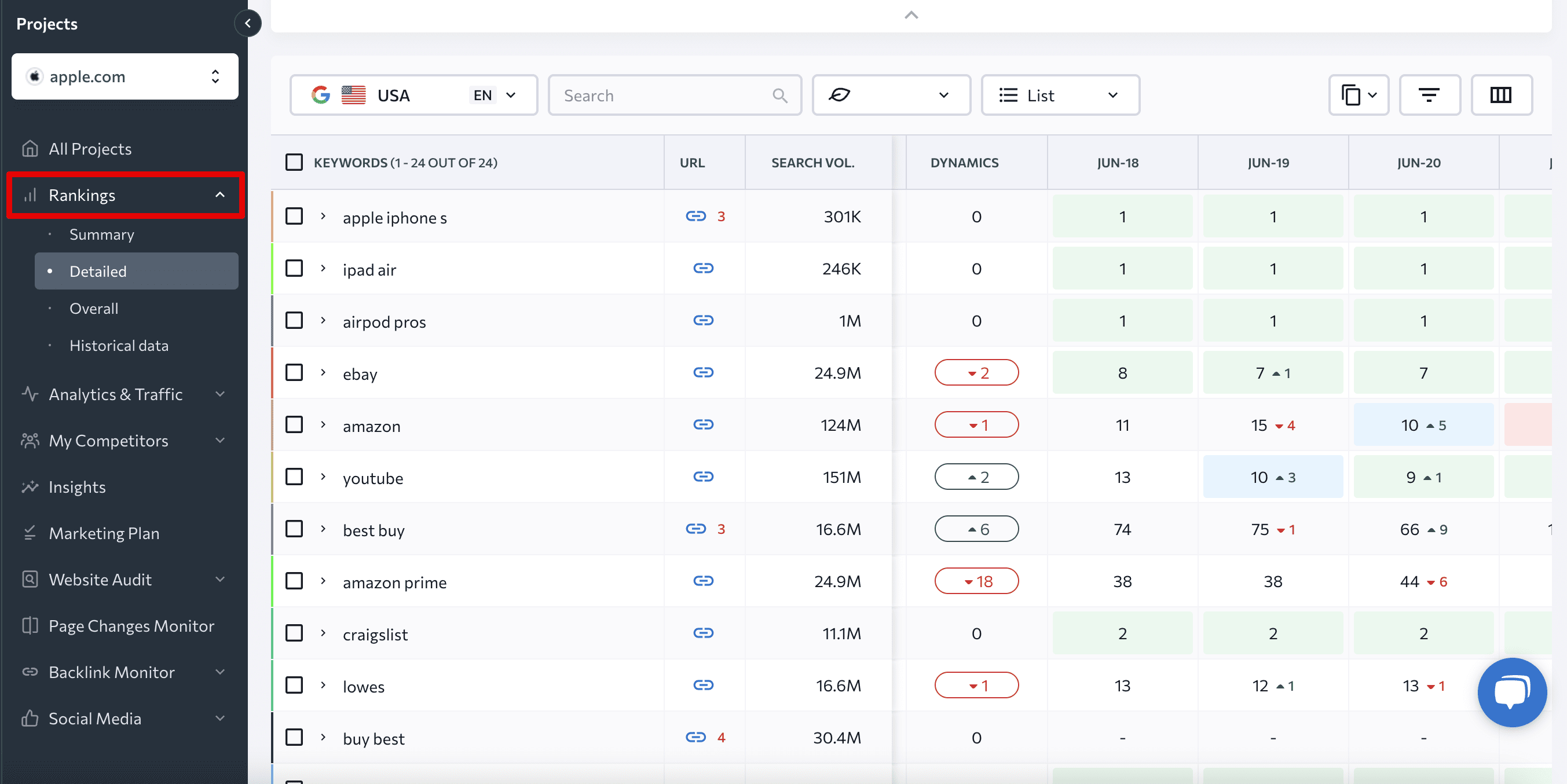
Monitor your reviews
Reviews provide valuable insights for improving business performance.
Always reply to client reviews, even if the review is negative. Your response can address concerns and demonstrate your commitment to feedback.
To view and reply to all reviews from one location, you can use SE Ranking’s Local Marketing tool.
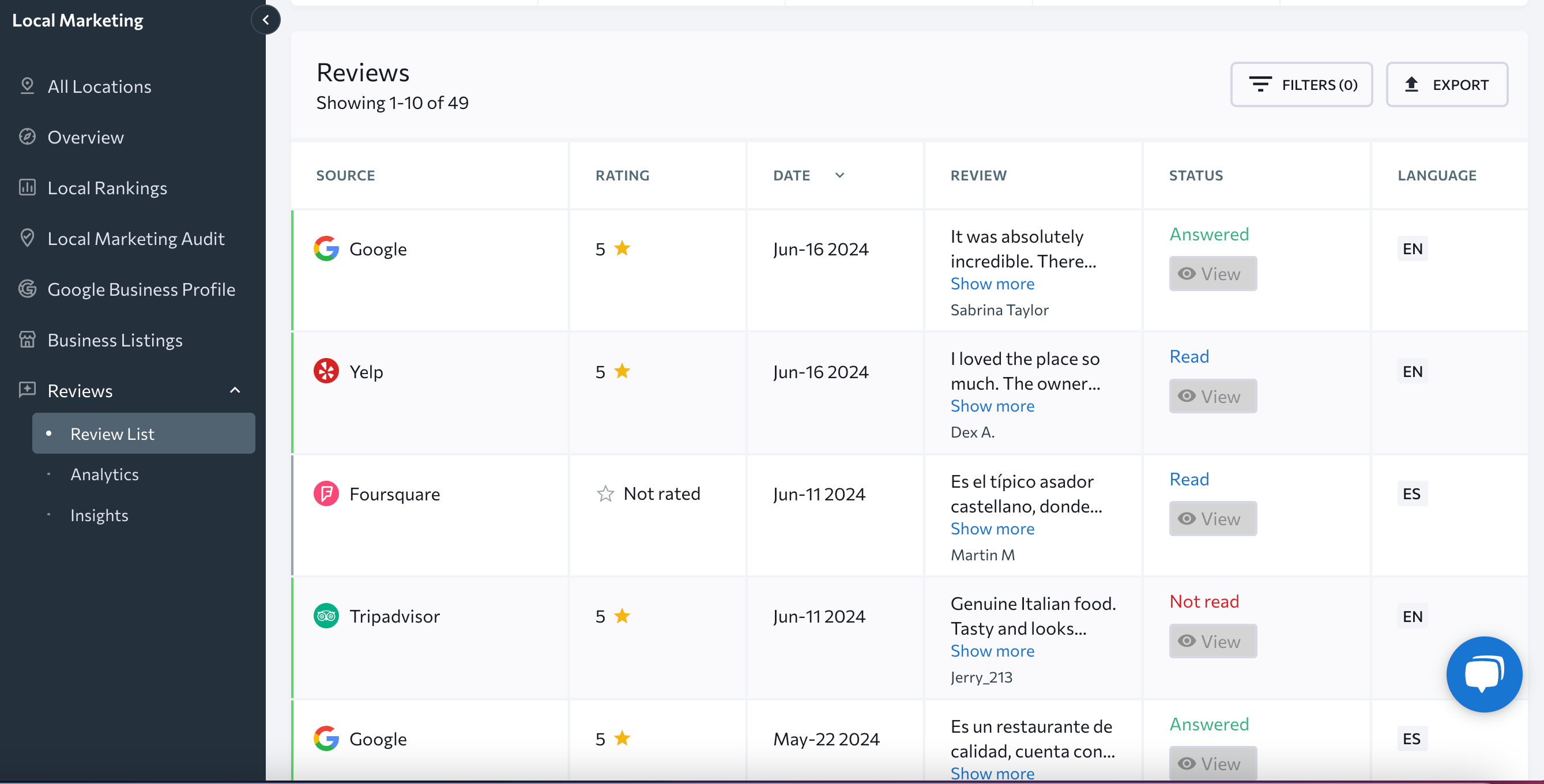
Reviews are a valuable source of insights because they help you understand what interests your customers most and what areas need improvement. They can also provide content ideas and potential keywords. Reviews are easy to track with the Insights section in SE Ranking’s Local Marketing.
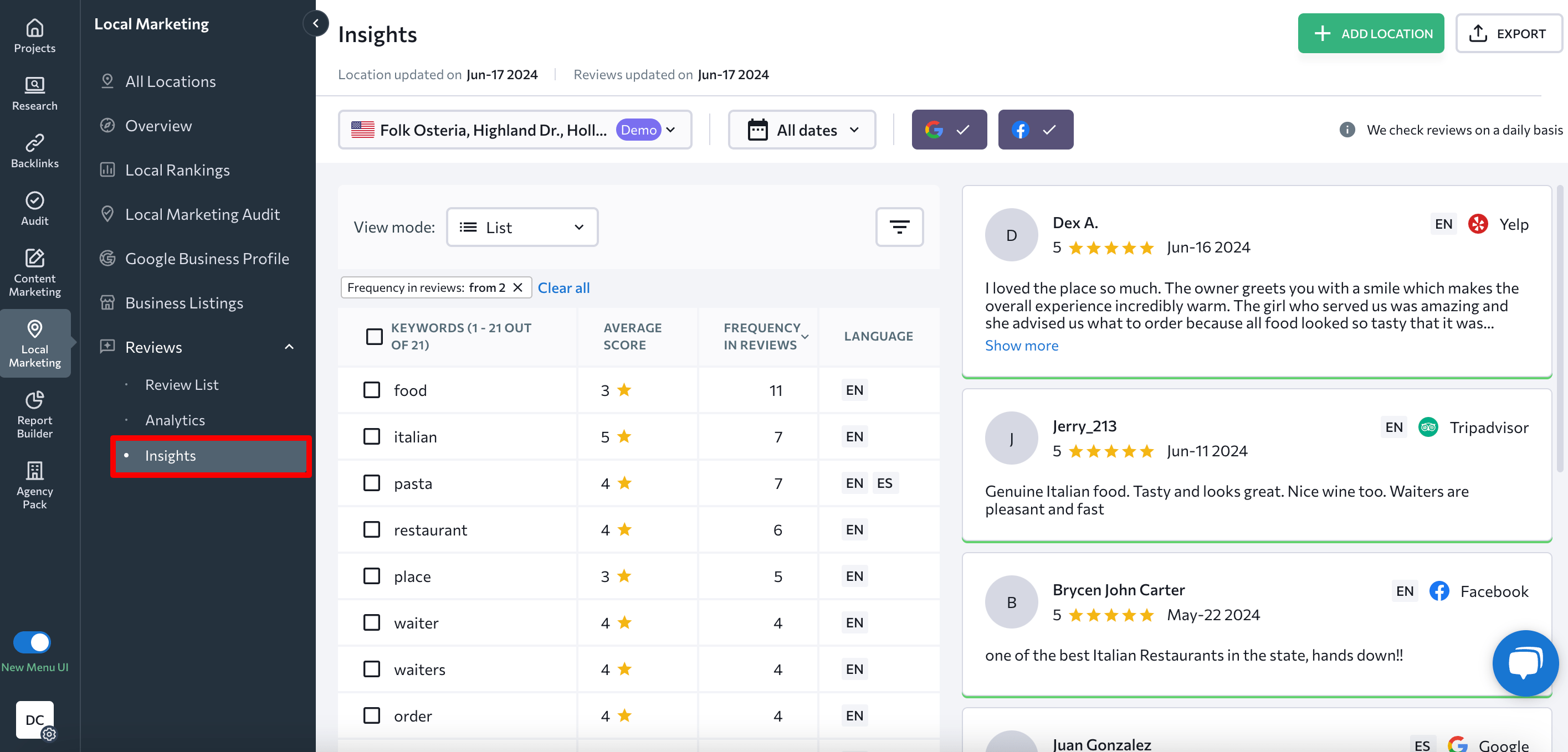
Looking to understand how SEO works in other industries? Our SEO for dentists and SEO for lawyers guides offer another perspective on how service-based businesses can attract clients through organic search.
How to implement SEO for plumbers
Once you have a general idea of what needs to be done to improve your business’s visibility in search results, you need to decide how to implement each of these steps. You can either handle things yourself or leave it to the professionals.
Option #1: Hire a plumbing SEO agency
If you don’t have the time or don’t want to dive into complex SEO processes, leave it to the professionals. You can easily find an agency that fits your needs in our Agency Catalog, which features a list of top SEO agencies across various niches.
To find an SEO company for plumbers, use the filters. Select the location ▶️ Specify SEO services ▶️ Select your industry (e.g., Home Services) ▶️ Choose the language if needed.
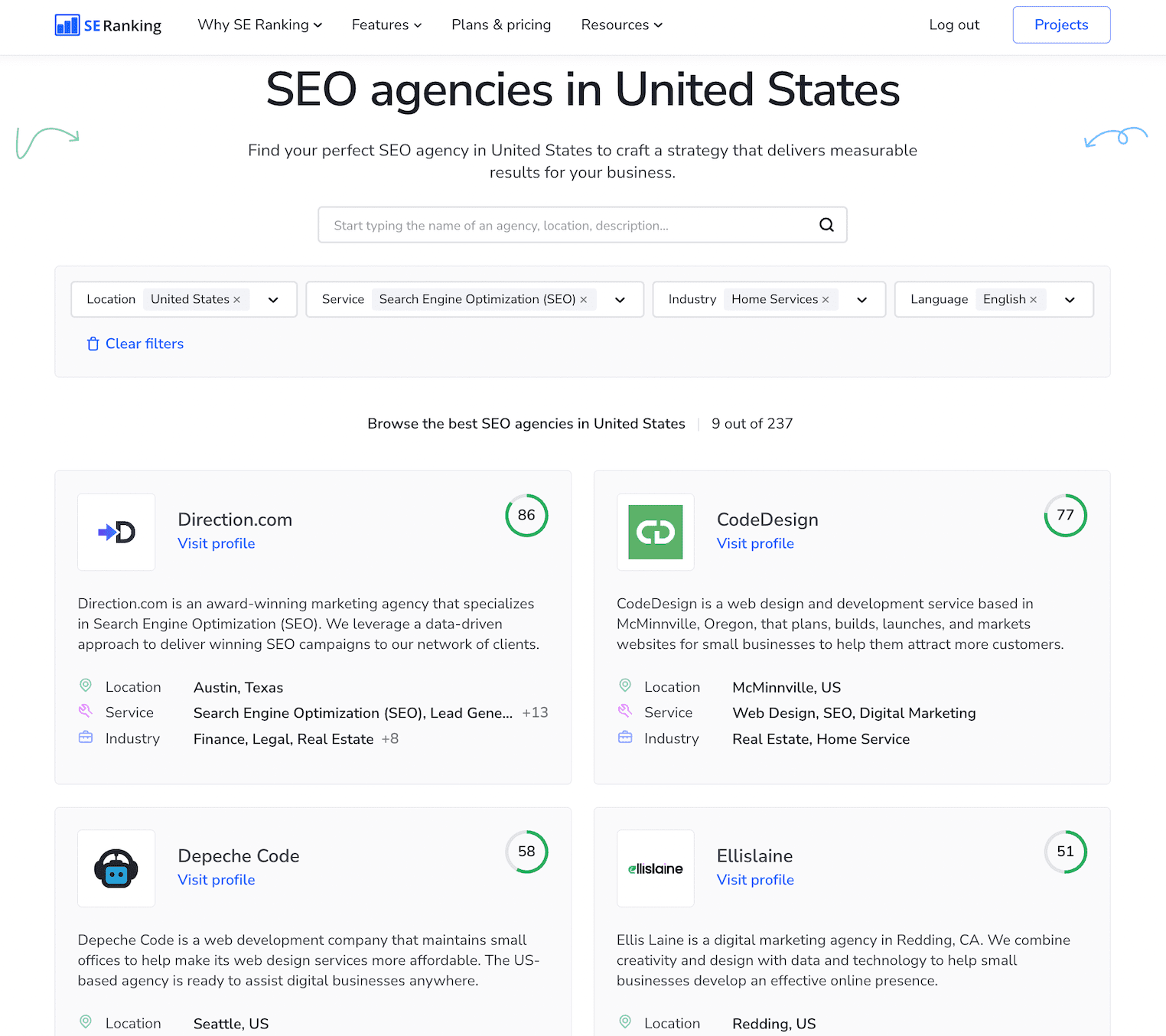
To choose the best option for you, do some research. For example, you can browse each recommended agency’s profile and website. Pay attention to each agency’s pricing and review its experience. Once you’ve made your decision, contact the agency through the form in the directory.
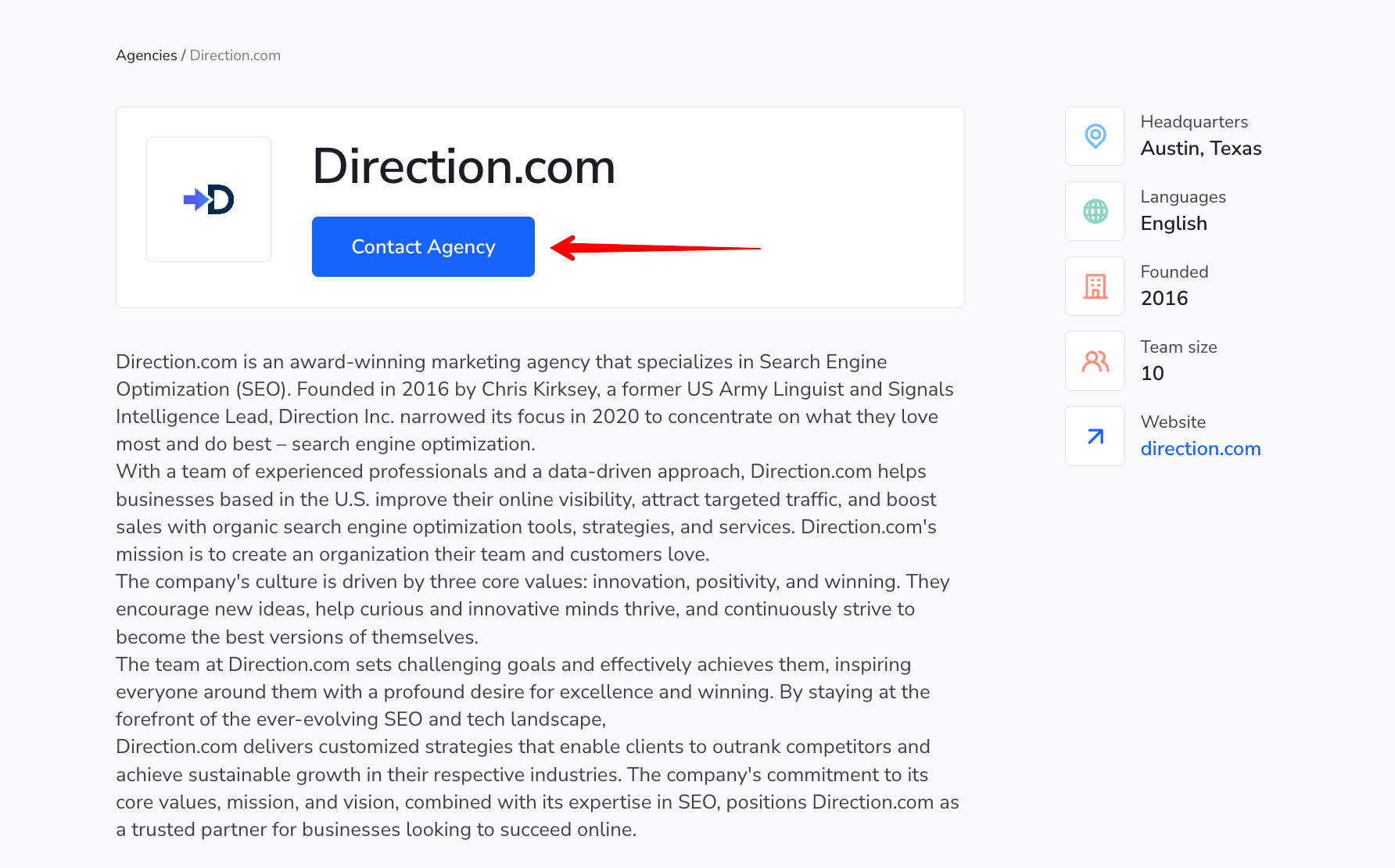
Option #2: Do plumbing SEO yourself
Consider handling optimization yourself if you are confident in your abilities and have the time and desire to do it. We recommend using SEO tools that help with every aspect of optimization, as they can make this task much easier.
For example, SE Ranking’s SEO platform covers all aspects of website optimization, including:
- Keyword analysis and suggestions, with dozens of metrics to help you choose the most promising terms.
- Competitor analysis, for both SEO and PPC strategies, including their rankings, traffic, and most popular pages.
- Keyword rankings of your website in global and local searches for any location.
- Technical site health checks, with tips on how to improve your metrics.
- Link building opportunities and detailed analysis of any backlink profile.
- AI-powered content creation and optimization.
You can test the platform for free for 14 days to see if it meets your needs.
Conclusion
SEO isn’t a one-size-fits-all solution, as each niche has unique optimization needs. Local SEO is the key focus for some businesses, while E-E-A-T factors matter most for others (like YMYL sites).
For example, local SEO is crucial for plumbers. Focus on optimizing your Google Business Profiles and listings, and monitor reviews. Also, address other SEO essentials like creating content that attracts traffic, optimizing your website’s technical aspects, and building quality backlinks.
By effectively addressing each of these areas yourself or by taking advantage of the various professional SEO services for plumbers available, you can improve your search engine rankings and attract more clients.
